
Travelling Without a Passport


How to Become a Tour Guide

So, you want to get paid to travel the world? Being a tour guide means you get to travel while working, be the envy of all your friends, and visit dream destinations all over the globe! You’ll meet people from everywhere, wake up in a different city every other day, and truly become a citizen of the world. But do you know what you are getting yourself into, and what it takes to land one of the best jobs ever? Read on to find out how to become a tour guide!
Travel to: Europe
Important to note: Though a lot of people living on the road are referred to as tour guides, in some countries, they’re tour leaders, managers, directors… the list goes on! It’s important to know that when you’re looking for travelling job opportunities, many tour guide job advertisements will be looking for licensed city tour specialists, who unlike you will be looking to stay put in one city
See Also: Every Question You've Ever Had About Group Tours

How to become a tour guide
If you’ve decided this is the life for you, but don’t know how to go about getting your foot in the door, here’s a behind-the-scenes sneak peek into what it takes to become a tour guide!
The pros of this job can’t be counted on just one hand, but becoming tour guide doesn’t mean a permanent vacation. It’s a competitive field, and you’ll have to work hard to keep your coveted role. You need to be dedicated, but you also need to know how to have fun. You’ll live out of a suitcase, answer hundreds of questions every day, and work with many different personalities and cultures from all over the world. A tour guide is at the heart of a tour and can make or break the experience. Translation: there is no such thing a “bad day.”
Your passengers have saved long and hard to come on your tour, and you need to do everything in your power, every day, to make sure they have the trip of a lifetime (no matter how challenging it might be). You need to be patient, fierce, tenacious, and most importantly possess a genuine passion for your passengers and profession. Still up for the challenge? Here’s what you need to do next!
Step 1: Research tour operators in advance
Do your research! It’s important to find a tour operator that aligns with your interests. Are you a history lover that enjoys a relaxed pace of travel with a more mature audience? Or do you prefer non-stop adventure and fast-paced city hopping with today’s youth? No matter the operator there’s a tour style that will fit your own, it’s just a matter of doing your homework to find them. And of course, different operators will require different levels of experience and external certifications depending on where their tours travel and what type of experiences you’d be facilitating as their guide.
You should also find out how much experience you need for the tour operator you have your eye on. Some tour operators won’t require you to have any previous experience and will instead invest huge amounts of time and money in “auditioning” you. These jobs are highly sought after by many young, enthusiastic adventurers, so the stakes are high. You’ll be looking at 2-3 months without an income, travelling through potentially expensive European cities and without any guarantee you have the job until you’ve passed the finish line! Pretty soon into the process, you’ll find out if you are up to the challenge and whether you have the necessary skills, personality and expertise to make it or break it as a tour guide.

Other tour operators may have much shorter training periods, but will need you to know a lot about the region you want to work in: maybe you’ve lived there for an extended period, or speak the language, or you have a degree related to the culture or history of the region. Your speaking skills will be tested in an interview before training, and finally, some operators will look for individuals that have been guiding or tour leading for at least a couple of years before they will even consider you. If you’re starting out, wait until you’ve got some solid experience under your belt before reaching out to these companies!
All in all, it’s important to choose an operator that fits your personality and travels to destinations you feel passionate about!
Step 2: Remember that it’s both a job and a lifestyle
Living a life on the road is both a lifestyle and a job. You need to have a consistent passion for learning, relentlessly optimistic outlook and dedication to hard work. If you’re one of the lucky few that lands the job you need to be prepared to give up everything about your old life. You will be on call 24/7, your own needs will always, always, be the last priority and you’ll find yourself with little to no time to speak with your friends and family back home. If you can make peace with all of the above, then focus on crafting the perfect application, preferably one that touches on your passion for learning, relentlessly optimistic outlook and dedication to hard work.
Spend plenty of time tailoring your application letter and resume to fit the role and the company you’re applying for. Experience with travel, being able to talk about history, culture, art and much much more at a moment’s notice and charisma will help, but you also need to think about who their audience is! What can you offer this company (that thousands of other applicants can’t) to convince them they are placing their valued customers in the right hands?
Be confident in selling your skills, especially the ones essential to successfully running a tour. Highlight any professional experiences like being able to perform under pressure, working with groups, and any relevant language or academic knowledge that will help you to stand out. Give examples of past experiences and anything else that will make your application jump off the page.
Step 3: Prepare for the interview process
The interview round depends on the company’s recruitment process. It could be one meeting or a series of meetings. The tour operator wants to see if you are the right fit for them and the real deal. It’s time to convince them that you can put your money where your mouth is. Come prepared with examples in your head, and be prepared for seemingly-random questions that will test your character, initiative, and even your general know how.
Tour operators invest a huge amount in their tour guides. There are very few other jobs in the world where people work so independently of their managers’ presence from the beginning of their employment. Their brand and their customer’s experience is the most important thing to them, and they should have no doubts that you are a superstar who can do the job professionally and support their goals. Get a good night’s sleep before your interview and enter the room calm, confident, and personable.
See Also: Everything Your Tour Guide Wants You to Know Before You Travel
Step 4: Study, study, study!
You’ve been accepted to progress beyond your application submission. Now’s time to get stuck into preparing yourself to become the rookie tour guide of the year! While organisational and personal skills probably come naturally to you, no one, no matter how much they have studied, is prepared for the questions you will face while on your first tour or training trip. And if you hate studying, you may as well peace out now!
Where is the closest cash machine? What kind of tree is that? When was that building built? What’s the major industry of that little town we just passed?
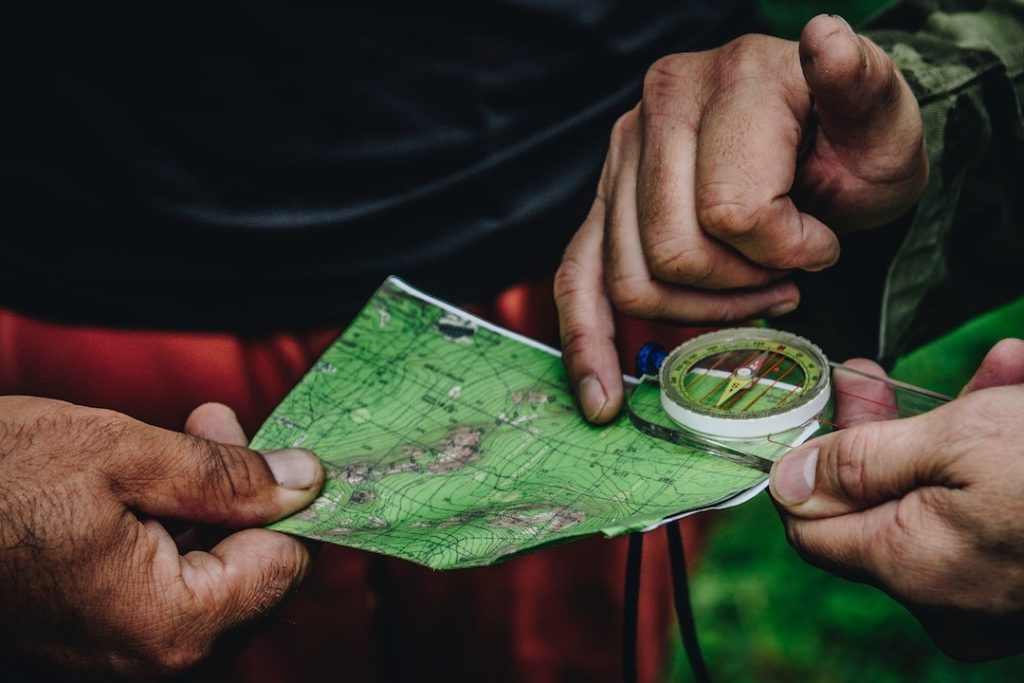
The more you know about history, culture, food, language, geography, politics, economy, and flora and fauna before heading out on your training trip, and hopefully your first tour, the better. You will never know all the answers, but you’ll learn smooth ways to own up to that, or find out and provide a helpful response shortly after (hello Google), or direct the passenger to where they might find out.
If the company you’ve applied to work with has a training trip before you embark on your first adventure with real, paying clients, they will be doing all they can to replicate every single possible tricky scenario you could come across on tour. Given that you’re applying for one of the most popular jobs in the world, it’s going to be intense, but that doesn’t mean you won’t get maximum satisfaction out of it. Making it to the end of your training is a huge accomplishment in itself. So p repare well, work hard, keep your wits about you and sleep now, because if you do become a tour guide, you can kiss more than six hours of shut-eye per night goodbye!
Step 5: Preparing for your first tour as a tour guide
You did it! You may have shed blood, sweat and tears to get here but you can finally call yourself a tour guide! It doesn’t matter if you’re new to this because everyone has to start somewhere. Celebrate the fact that you’re here because experienced touring professionals believe you have what it takes to take passengers on the trip of a lifetime. So have some confidence in yourself. Your colleagues and peers can help you when you need it but focus on the most important thing of all, your passengers! If you gain their respect and they can see you know what you’re doing, you’re well on your way to being a roaring success.
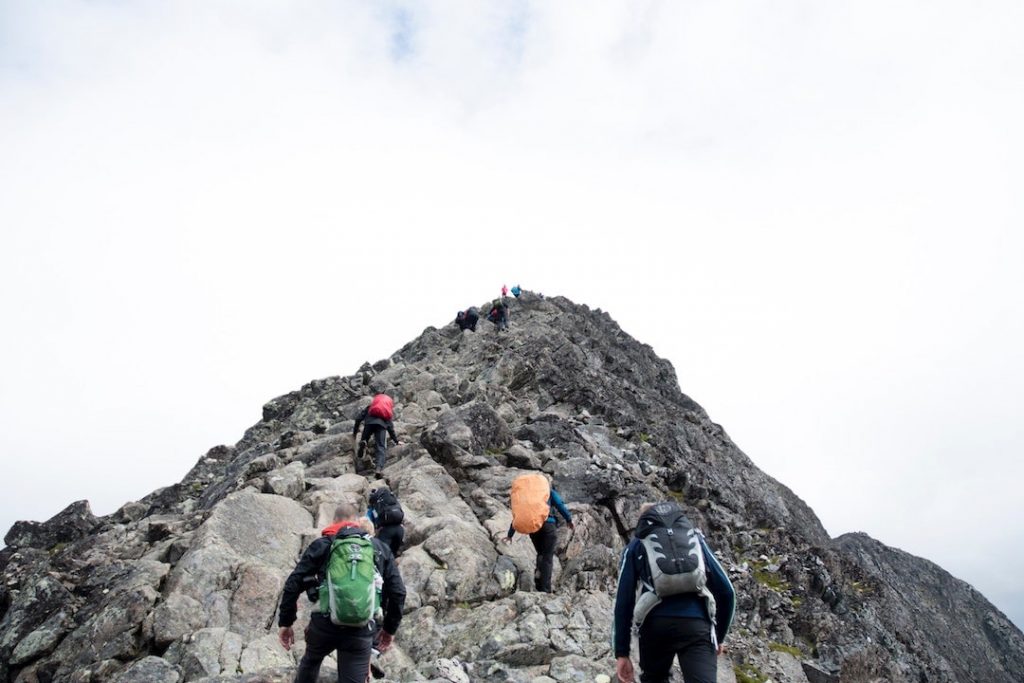
Now that you’re a tour guide, there are a few other things to keep in mind. Your life will change. This isn’t a run of the mill 9 to 5, but if you’re leading a group of tourists towards the pyramids of Giza then you already knew that! Irregular hours means keeping in touch with loved ones or having a routine isn’t easy, but standing at the foot of the world’s greatest wonders will outweigh the crazy hours and lack of routine. If you love what you do, then none of it will feel like a sacrifice, in fact, you might even say all of the above is the best feeling! Not many people can call the world their office or say their day job includes visiting incredible sights and attractions that the rest of us dream about.
Requirements to become a tour guide
Work permits and passport.
Before you begin your application, do a solid check on the work permit requirements. Are you legally able to work in the country where you’ll be touring, or is there a visa or work permit you’ll need?
Before investing your time, heart, and soul in a solid job application, make sure you’ve got the legal parts covered.
See Also: Most Difficult Countries to Get a Visa
When to apply
Most tour operators will hire in preparation for their peak season. If you’re interested in working in the Northern Hemisphere, it’s best to apply around September, as applications will usually close before the new year to have training arranged in the first months of the year.
If you want to work in a region with year-round tourism (such as South East Asia, for example), check with the company to see when they run their training trips, or when is the best time to apply. If you’re lucky, they’ll tell you they can take an application anytime!
If you’d like to work in Australia and New Zealand, applications are generally taken around mid-year in preparation for the summer. As there is more demand for tour guides in summer months in most regions, the operators hire and prepare new tour guides for the peak season. Those tour guides may then apply or request to also have some winter work.
If becoming a tour guide is for you, maybe it’s time to start doing your research on which companies you’d like to apply to! It may seem like a daunting task, but for those suited to the job, it’s a dream come true.
Have any questions about the process? Ask us in the comments below!

Finally settled down in Vienna after 9 years of leading tours in Europe, Leona first joined TourRadar in 2016. She speaks four languages and enjoys cooking authentic traditional recipes, walking in the hills around Vienna and arranging beer coasters so they're all facing the same way.
Related Articles
- Tips & Tricks
Best Destinations for People with Disabilities
The world and its wonders should be available to one and...
- Destination Guide
Where to See the Northern Lights in February
If you hope to see the Northern Lights in February, you’re...
- North America
Cheap Places to Travel in the US
From California’s shimmering coast and Colorado’s snow-dusted peaks to Louisiana’s steamy...

The Best Halloween Parties and Events Around the World (Updated 2023)
Get unlimited access to the world's best travel stories. subscribe now., privacy overview.
Team Wanderlust | 31 July 2018
Get paid to travel: become a tour leader.
Do you have what it takes to become a travel guide? It can take you all over the world, but you'll need buckets of passion, endless knowledge and a big dose of patience...
Let’s get this straight: it is a ‘proper job’. Sure, you’ll lose your fear of Monday mornings. And yes, your ‘office’ may be a Kenyan national park, a Himalayan valley or a large area of Amazon jungle. Your friends will think you get paid to go on holiday again and again – a kind of Groundhog Holiday, if you will.
But don’t be deceived: tour leading for an adventure travel company is very much a proper job. The hours are long (when have you worked nine months without a day off?), you’re on call 24/7 and, while it may look easy, behind the scenes it’s a huge amount of work. Your job could be described as being like a swan on water - graceful and calm on the surface, with your legs frantically paddling underneath.

What jobs are there?
Tour leading is not a single job – there are many different kinds of tours, like driving overland trucks from London to Cape Town, or leading rambling groups around the vineyards of Tuscany. There are jobs touring the general sights of countries, sailing the Nile in a dhow, guiding safaris, mountain biking, doing European cultural tours, riding horses, carrying out conservation work, or leading family trips.
Some are more extreme than others – the skills needed for leading a centre-based holiday in the Pyrenees are very different from those required to climb a Himalayan peak or lead a jungle expedition.
What's in it for you?
A lot of travel, of course. You’ll find that leading gives your travel a new depth – when you're working alongside locals, they'll see you as an equal, not as a customer. What other job would let you build a deep friendship with a Vietnamese waitress or a Berber muleteer? Ask most leaders what they most like about the job and the answer won’t have anything to do with travel. You'll learn a lot about yourself, developing your interpersonal and leadership skills in ordinary and extraordinary situations. It's also a job with real autonomy – your boss may be 12,000 miles away!
What are the downsides?
All of these plus points have their down sides. You might repeat the same two-week itinerary ten times, yet you have to be as fresh on the tenth as you were on the first. Whatever goes wrong, you have to deal with it, whenever it happens. Your clients might be rude, your transport connections could be late, or not turn up at all. Yours and your clients' personal belongings can be stolen, or worse, your clients could get ill - and that's all your responsibility to deal with. As well as all of those negatives, it can also be lonely work - having to spend long periods away from your close friends and family.
How to get a job as a travel guide
- Don’t apply unless you are well travelled. Ideally you’ll have explored some unusual parts of the globe and been on some extended trips, such as a career break. But remember, the most important thing isn’t travel – it’s people.
- Stress your people and leadership skills. Anything you can do to prove that you have experience of a service industry, and of leading or teaching people, will be a great benefit.
- Get an understanding of what is required. Research the job thoroughly by checking out all the web-links listed, and getting to know the style of the company you are applying to.
- Visit travel shows and exhibitions. Prove that you’ve done your research and that you aren’t just acting on a whim. Companies will need to see that people are serious about the job.
- Go on a trip with the company you are applying to. It'll give you a great insight into what it's like to be part of a group on holiday and see a real-life tour leader in action. While you're there, ask the tour leader exactly what they're doing on a day-to-day basis.
- Make sure you have specialised skills, such as a foreign language or a PCV driving licence. While they aren’t essential for all jobs, they are for some, and give you a great advantage. Knowledge of first aid, or specific country knowledge, is also good.
- Be ready to answer the question: “What would make you a good tour leader?” It’s an obvious question, and if you can’t answer it fluently, you shouldn’t be applying.
A word from a pro: Nick Nikolsky
Nick worked as a full-time tour leader over many years, covering everywhere from the faroe islands to cambodia. so how did he do it.
“In my gap year I worked abroad teaching English, then after uni as a diving instructor. I saw an advert for a tour leader in Wanderlust (honest) and applied for the job, expecting to do it for a short while. I ended up doing it full time for five years.
“My first trip was a walking tour in Slovakia. I had been trained in the UK and abroad on an actual walking trip and knew roughly how leading worked, but I was nervous at having to look after 16 people for two weeks all on my own. Needless to say I didn’t let the group know it was my first trip! By the end of the fortnight, I knew this was what I wanted to do as a job.
“You start getting a lot more than just travel experience when you’ve done the job for a year. You build up your people-handling skills, you encounter and solve strange new problems – all of which are great skills for whatever you do in life.”
Top tip: “Be yourself at the interview and if you are enthusiastic about travel and a people person, you should sell yourself without having to try.”
With thanks to Nick Nikolsky, Andrew Aitcheson, Matt Leggett and Debbie Crawford for their help with this guide.
Check out Wanderlust's job site for job opportunities in the travel industry.
Related Articles
Looking for inspiration.
Join our newsletter
Get the very best of Wanderlust by signing up to our newsletters, full of travel inspiration, fun quizzes, exciting competitions and exclusive offers.
- The Pantheon of Paris
- World’s Most Polluted Cities
- The Dancers of Hahoe
- Dynasties and Destruction: History in Gyeongju
- Hiking in South Korea: The Odaeson

Sunshine Seeker
Dream ◇ Create ◇ Travel
Popular categories, how to become a travel content creator: step-by-step guide.
By: Charlotte · Last updated 18. March 2024 · In: Blogging , Social Media
Are you wondering how to become a travel content creator? Then you’re in the right place!
In 2012 I was on the waitlist for Instagram to become available for Android, and in 2015, I decided I needed to come up with a way to make money online to create more freedom to travel. I knew instantly that I wanted to become a travel content creator .
There weren’t many professional Instagrammers to learn from at the time, nor were brands used to working with influencers, so I made a lot of mistakes in the beginning.
Since then, however, I have worked as a creator for 8+ years and on the other side, for a tourism board. And that means I know a thing or two about how to become a travel content creator and what brands and tourism boards look for when working with content creators.
🌟 Skip the guesswork and grab all my personal templates in the Travel Creator Toolkit !
Article overview
Is a content creator and influencer the same?
Passive income as a creator, 1. learn & plan, 2. find your secret sauce, 3. niche down, 4. pitch & build relationships, 5. build your portfolio, 6. work on your mindset, 7. consistency is key, the travel creator toolkit, remember to pin for later 😉, what is a content creator.
A content creator is someone who produces creative and engaging content for various media platforms, such as Instagram, blogs, podcasts, YouTube, etc. And a travel content creator is, of course, a content creator who focuses on content in the travel niche.
The role of a content creator involves a range of tasks, including generating ideas, researching and writing content, creating videos and shooting photos, editing and proofreading, managing social media accounts, analyzing data to measure the success of our content and reporting results to brands.
A content creator is necessarily not the same as an influencer. These days you can create UGC content for brands that you don’t post on your socials at all. You are also a content creator if you run an informative blog that people visit if they have a certain question.
An influencer, on the other hand, is a person who has built a large following on one or more platforms. They use their influence to promote products, services, or ideas to their followers and can have a significant impact on consumer behavior.

Why become a travel content creator?
Before we look at my step-by-step guide to becoming a travel content creator , I wanted to quickly touch on why. Because, while working and earning money online as a content creator is a lot of fun, it is also a lot of hard work.
Pitching , no responses, endless hours of editing , reporting on results, engaging, building relationships, getting up early and staying up late to catch the perfect light, etc. So you have to want it to be able to stay with it when it gets hard.
Make sure this is something you really want to do, and that you have a passion for photography, video and/or writing. Try it out with some places close to home before you quit everything to head out on the road. Maybe a hotel in your hometown could use some fresh content?
When you are sure this is for you and you play your cards right, you get to explore the most amazing places while receiving email notifications like this:
As you can see, in addition to brand partnerships, you can also set up passive income streams that more or less run on automation while you are sleeping or are out having fun.
And that’s exactly what I want you to experience. The feeling of location and financial freedom. So your office also can look like this someday. It might look like I was in Japan…

Or somewhere in Africa…
But this was actually my office in Norway yesterday. For the last couple of months, I’ve been traveling in my home country, learning to appreciate what I’ve taken for granted for so many years. The incredible beauty that Norway has to offer . So yesterday my mom came to see me south in Kristiansand, and we went to the zoo.
Normally I wouldn’t recommend animal attractions, however, Kristiansand Zoo does incredible work with the conservation of some of the world’s most endangered species. So I’m happy to promote it.
I still had a course update to finish, so I spent a couple of hours working in the most beautiful surroundings and then enjoyed the rest of the day with my mom. Something I would not have been able to do on a regular Wednesday if I was stuck in a 9-5.
Norwegian: Hvis du vil lære mer om passiv inntekt, sjekk ut min norske side her .
7 steps: Become a travel content creator
Now, let’s get to the juicy part. If I had to start over as a travel content creator knowing what I now know, this is exactly what I would do.
How do you plan on making money? Mainly through brand partnerships or are you thinking about additional income streams? Do you want to create a blog in addition to Instagram? Or are you focusing on TikTok? The first thing you should do is make a plan.
My number one tip is that you diversify your income from the very beginning. In addition to brand partnerships, think about how you can make money through affiliates and maybe selling digital products . When I started, I made money through affiliates before I made anything from brands. You can easily share affiliate links for products in your niche through stories or on your blog.
Learn as much as you can before you start so you can go straight for the money, don’t fumble around like I did for so long. Take advantage of living in a time where we have all the knowledge in the world at our fingertips.
There’s lots of free content around, however, I started seeing results when I invested in myself. I truly believe that the transformation is in the transaction. After completing 79 courses these are the very few I recommend:
- Pro Blogger Bundle by Create and Go : Covers everything you need to know about making money online through a blog and social media with affiliates and digital products.
- 6 months to 50k : This course helped me almost triple traffic to Sunshine Seeker, even though I already knew SEO. If you want to have a travel blog as part of your monetization strategy, there’s no one better to teach you than Nina Clapperton.
- Making Sense of Affiliate Marketing : Created by Michelle who earns more than $ 50,000 a month through affiliate marketing.
- The Travel Creator Toolkit : This is my baby, a collection of all the resources I have used over the years to make money as a travel content creator
Build an email list
Have you ever heard the saying, the money is in your list? That’s true for travel content creators as well. And that’s why I highly recommend you start growing an email list from the start.
You can get shut out of your social media and your website can get hacked at any time, your list of people who have chosen to interact with you is the only thing you truly own.
You can create a freebie to grow your list using my free Canva ebook template .
🌟 The reason why I am where I am today, able to travel wherever I want whenever I want, is because of this course (part of the Pro Blogger Bundle). And that’s not an exaggeration! You literally get an email marketing course within the course about creating digital products. Remember that the more passive income you can create in addition to working with brands, the more freedom you’ll have.
What do you know/do better than 8 out of every 10 people? That is what’s going to earn you a lot of money.
Do you draw or paint? Start an Instagram where you draw the destinations you visit. Film behind the scenes of you painting, the destination vs. the painting, etc. I can see so many pieces of content created out of one painting. Someone might already be doing this, I don’t know, but you get my point, right?
Find your uniqueness and highlight it!
Do you love fashion and plan the perfect outfit to fit in with every destination? Do you have a unique photography or videography style that stands out? Do you dance your way through the world? Are you a history buff with a lot of knowledge of historic places?
Use what sets you apart from everyone else for everything it’s worth!

And when you find your secret sauce, niche down. This is something I regret not doing when I first started. You don’t have to stick to one narrow niche forever, but it is so much easier to grow in the beginning when you focus on one thing. As I mention in my free pitching guide , brands are more likely to work with micro-influencers with a clear niche.
Your niche can be a specific destination, weekend guides in Europe, ethical animal attractions, travel with a handicap, street food, you name it. When you create a presence or an audience within a specific niche, you have a much larger chance of getting a yes from brands in that niche.
Just think if a yoga brand was considering working with a general travel influencer with 100,000 followers or a yoga travel micro-influencer with 10,000 followers. They know that most of the followers of the yoga influencer are most likely interested in yoga. However, they have no clue how many of the followers of the larger influencer are interested in yoga.
And when you grow, you can broaden your niche.
Must read >> 23 amateur blogger mistakes you are probably making
Start looking for brands that you would like to work with and put together a list. You can use the pitch tracker in my Travel Creator Toolkit or just Google Sheets.
- Pro tip: Whenever I see one of my fellow travel creators doing a paid collaboration with a brand, I always check it out to see if it’s a good fit with my audience as well. Remember that it’s easier to get a yes from brands who already see the value of partnering with creators.
Follow and engage with these brands on Instagram, only genuine engagement of course. If you already own one of the products or have used a service and have some great content, post it and tag them to show what you can offer.
Then start pitching. And this is a number game, when I first started I sent out 10 carefully tailored pitches every week. You can get one of my pitch templates for free when you sign up above or at the bottom of this page, or you can get all my pitch examples in the toolkit . Remember to also check out my complete pitching guide for micro-influencers .
And start building your audience as soon as possible. My number one advice is to let your followers get to know you through stories. People are more likely to buy from you and support you when they feel connected to you.
Remember that you don’t have to be an influencer with a huge following to work as a travel content creator. You can create UGC content, you can reach out to brands, hotels and destinations to help with their overall online presence, you can take over their Instagram, etc.
It all comes down to how you can help the brand do something they can’t easily do themselves. So think about it, how can you offer value to both the brand and your audience?
UGC content
User-generated content, UGC, is all the rage right now. Think of it as our digital age word-of-mouth marketing. It is original, brand-specific content created by customers and published on your or the brand’s social media, website or used as ads.
I’ve seen a lot of smaller creators earn more money creating UGC than huge influencers with hundreds of thousands of followers.
I recommend pitching a package of videos for the brand to use as ads with a few different hooks so they can test to see what works best. That means you film one middle part of the video and maybe three different intros and outros with different hooks that will catch the attention of their different customers. Then the brand can edit the videos together as they please.
NEW! There’s now also a beginner’s guide to UGC in the Travel Creator Content .
Before you leave home or quit your job, build up your portfolio. You can showcase your skills without having worked with any brands. Maybe you have taken some incredible photos or videos on a previous holiday? Maybe you have done some barter partnerships without getting paid? It doesn’t matter as long as it shows what you can offer!
In the beginning, I put everything together in my media kit (you get five different templates in the Travel Creator Toolkit ). From the media kit, you can link to any online portfolio like a travel blog, Instagram, TikTok, etc.
When I had a few paid partnerships under my belt I created a case study that I sent out together with my media kit. The case study outlined the brief, the content I created and the results I achieved. This is when I started to see some real traction and after a while brands started reaching out to me first.
Remember that all the people you pitch are different just like you and I, so they will be looking for different things. The best thing you can do is just to start somewhere to see what works in terms of pitch copy, media kit, case studies, etc. in your niche. Remember that clarity comes from action not thought!
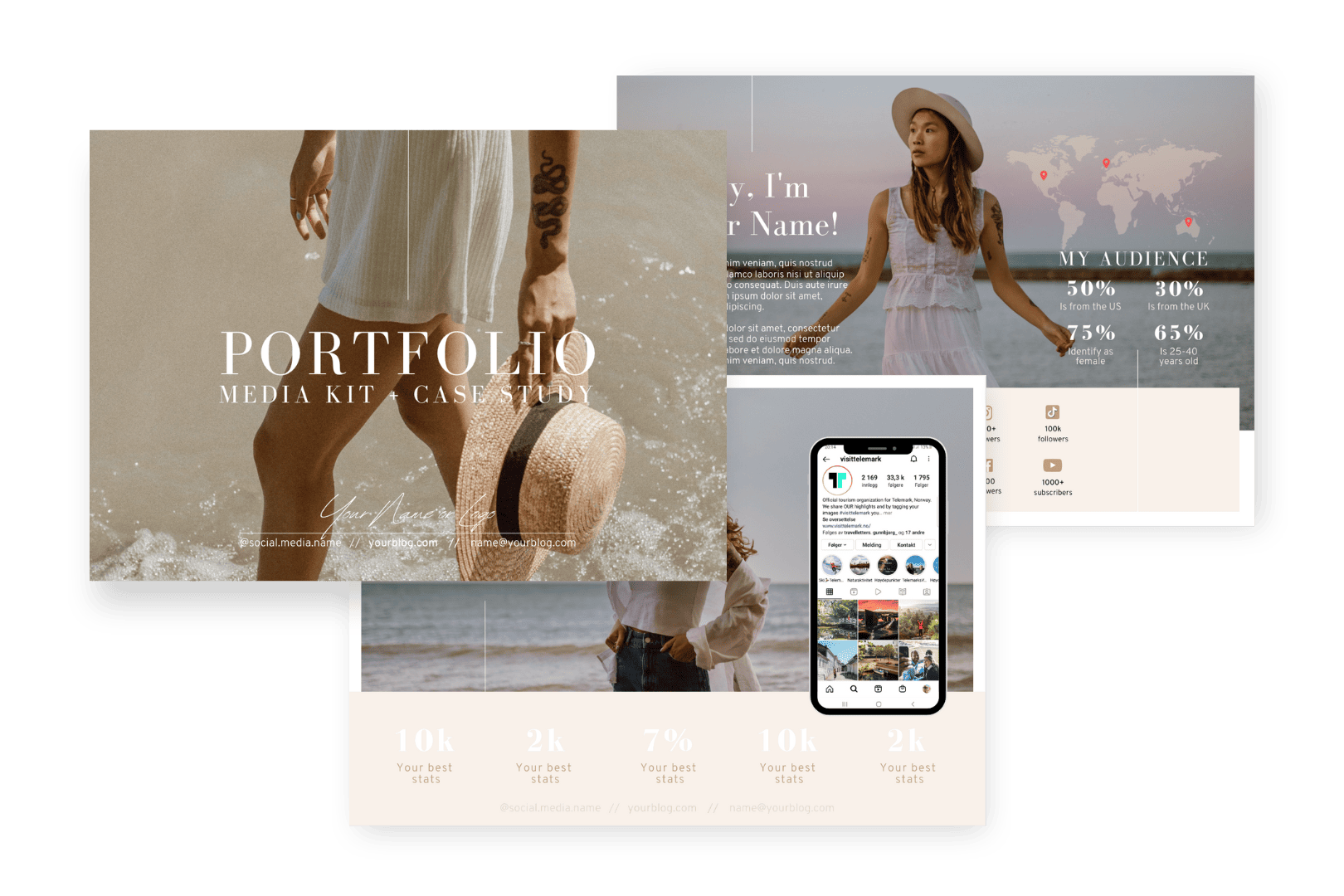
I believe that success in any area of our lives comes down to 80% mindset and 20% strategy, so I work on mindset first with all my clients. Be sure to read about my 8 best strategies to cultivate a success mindset as a creator.
Because you will hear “no” more than you will hear “yes” in the beginning, don’t take it personally. Sometimes the brands have spent their marketing budget for the quarter and sometimes it’s just not a good fit. That’s all part of being a travel creator.
You might also realize you have some money blocks when you have to ask about a campaign budget or send an invoice. So work on your money mindset from the very beginning. There are lots of free resources on YouTube, I also talk about it in the Travel Creator Handbook in the Travel Creator Toolkit .
For me, journaling also really helped to get to the bottom of why I felt resistance to pitching and asking for money. And I still use affirmations every day.
Ask yourself, is the fear greater than your desire for location and financial freedom? Would you regret not just going for it? What do you have to lose?
Don’t keep yourself from following your dreams just because you are embarrassed to be seen at level one. Remember that those who are now on level 100 once started exactly where you are. The only difference between you is that they went for it!
It also doesn’t hurt to speed up the process by manifesting your dream brand partnerships. I manifested a campaign with the tourism board of one of my dream destinations. It’s not a coincidence that my dream tourism board was one of the very first to reach out to me.
Also, prepare for some interesting experiences on the road. Travel doesn’t always go to plan and that’s just how it is. You can check out my take on the advantages and disadvantages of digital nomad life here.
Consistency in your posting schedule, the value you provide and the look of your content are essential as a travel content creator.
You don’t have to post several times a day on all the channels to grow. The most important thing is that your content offers some kind of value. Why should people care about what you post? Mini-travel guides in the caption have done really well for me recently.
Also, I have found the sweet spot for me, between growing and not getting burnt out, is to post 4 reels and 2 carousels a week on Instagram. Plus 4-7 stories six days a week. Then repurpose this on Facebook, TikTok, Pinterest and shorts if you’re on YouTube.
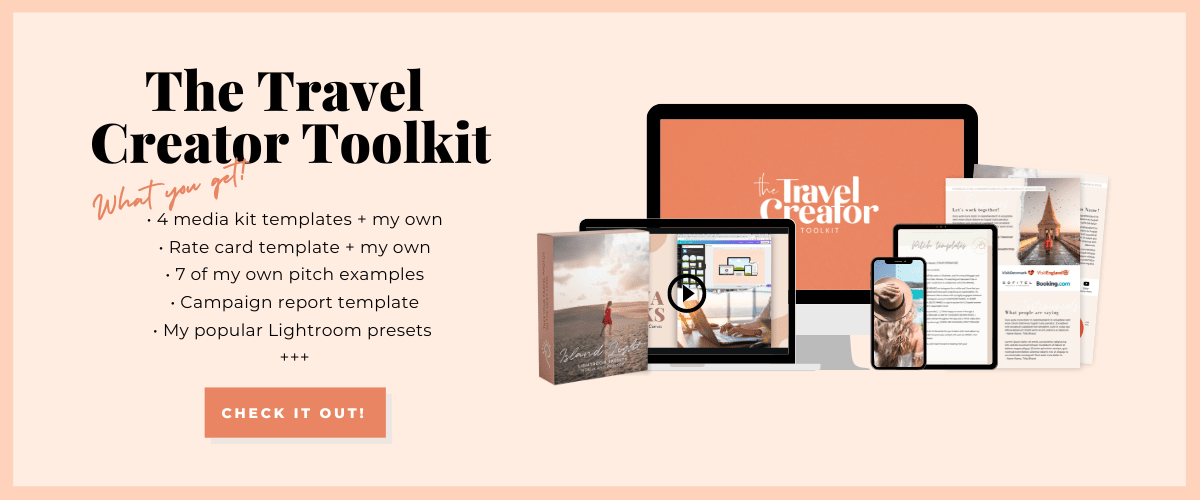
Want to skip months of trial and error? Get everything I have used to create my travel content creator business . In addition to everything you see above you also get a month’s worth of captions, my pricing guide, case study template, best pitching practices checklist ++
You also get lifetime access to the toolkit and all updates for free (I update and add to it regularly).
Take it from someone who has been a travel content creator since before it even was a thing, and made a lot of mistakes; don’t waste time. Time is the most valuable resource you have, just think where you could be a month or even a year from now if you get started today!
Safety as a content creator
One thing that’s easy to forget on the quest to become a travel content creator is insurance. Remember that regular insurance often won’t cover travel over longer periods of time. And if you decide to go all in as a creator you probably want to stay on the road for as long as possible, especially in the beginning.
Luckily there’s a solution…
✈️ Introducing SafetyWing’s Nomad Insurance , a travel medical insurance that was created for nomads by nomads.
🌴 The best part about SafetyWing is that you can purchase a policy even if your trip has already started. 185 countries are covered and you don’t need to let them know about your itinerary in advance.
💸 And the second best part is that the insurance is subscription-based, you can pause and resume your coverage with flexibility. No more paying for expensive insurance year-round when you don’t need it!
🤩 It’s perfect for people like me, and maybe soon you, who don’t know where we’ll be next month. You’ll find my complete review here .
Click here to learn more and get a quote!
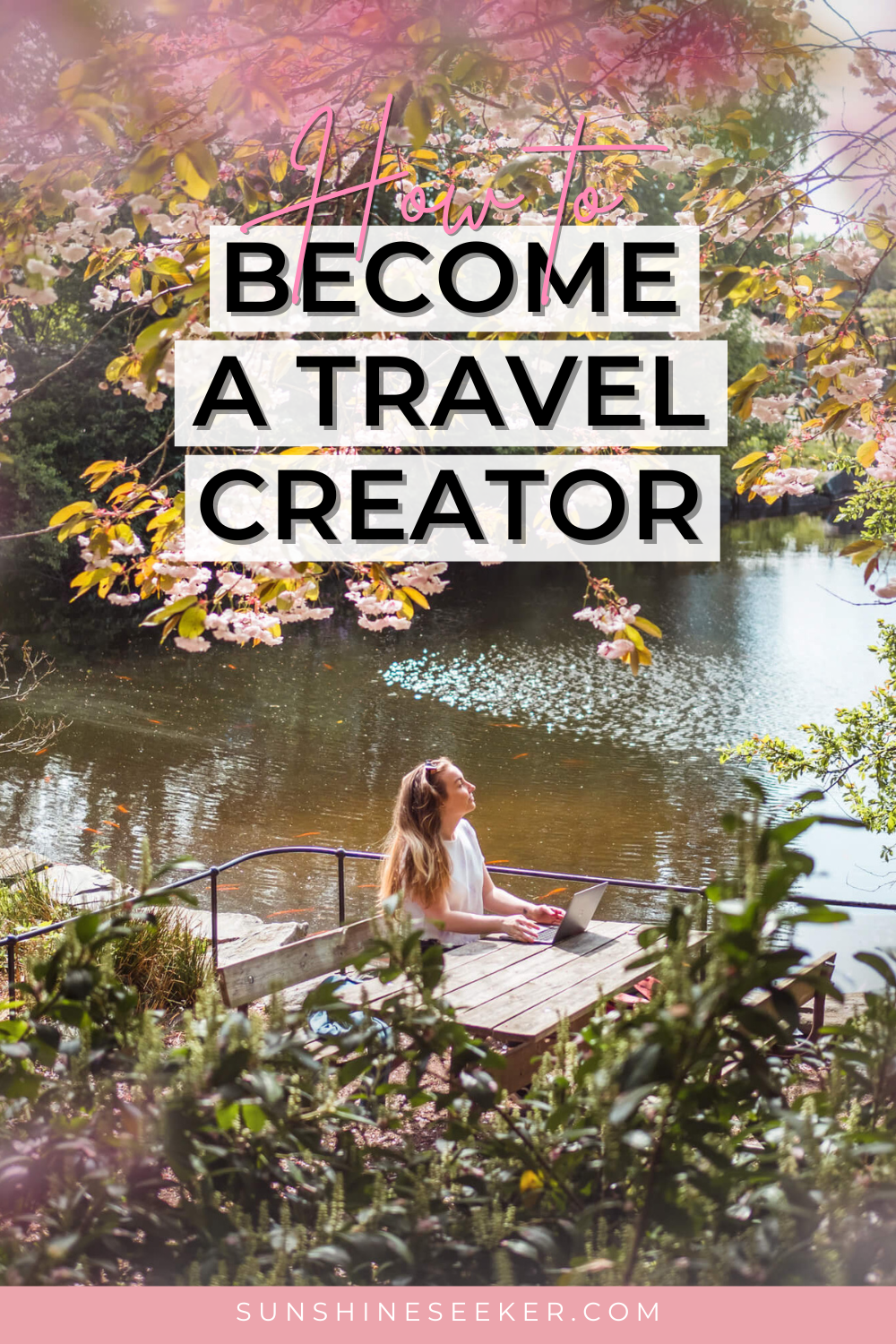
About Charlotte
Charlotte is the passionate traveler and online business coach behind Sunshine Seeker. She started working as a content creator on Instagram in 2014, before social media was even a thing, and as a travel blogger in 2015. Over the past 14 years she has explored 45+ countries and lived in Oslo, Kraków, Bali and Lombok. Every month she helps more than 50,000 people plan their adventures and learn how to create more freedom by working online.
You’ll Also Love
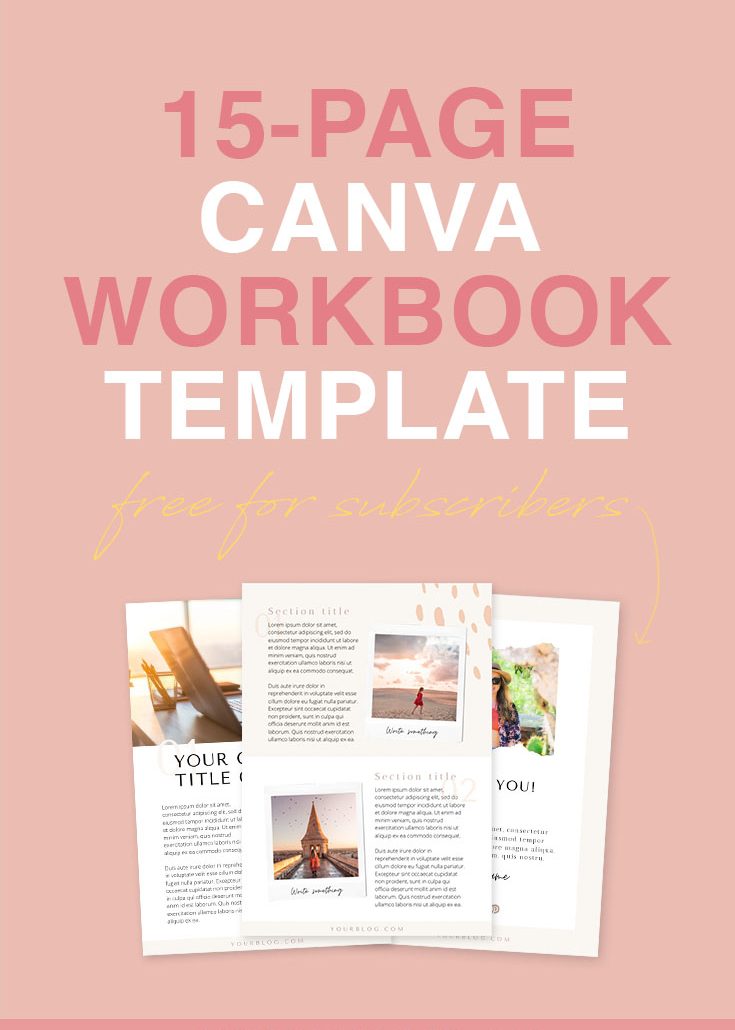
19. December 2023 at 07:24
Wow! Your guide for people who want to make travel content is amazing! It gives a really clear plan for success. I like how it talks about making money in different ways, finding what makes you special, and getting to know brands. The toolkit suggestions and tips on staying positive are really helpful too. Thanks for sharing this great guide! It’s super motivating for anyone who wants to be a successful travel content creator!
26. December 2023 at 12:58
I’m happy you find the guide helpful, Xeni! Thank you for commenting 😀
20. January 2024 at 10:02
Thanks for this!
20. January 2024 at 14:16
Thanks for stopping by 🙂
Leave a Reply Cancel reply
Your email address will not be published. Required fields are marked *
Save my name, email, and website in this browser for the next time I comment.

A first-timer’s guide to Cartagena Spain cruise port
Join the travel creator club.
Sign up to receive one of my favorite Lightroom presets + my tour/product collab pitch template!
By clicking "SEND" you confirm that you want to join our mailing list and that you have read our Privacy policy .

I’m social…sort of!
Join me on Instagram

- Privacy Policy
- Affiliate Disclosure
- Terms & Conditions
As an Amazon Associate, I earn from qualifying purchases.
Copyright © 2024 Sunshine Seeker
Travel Guides: Apply
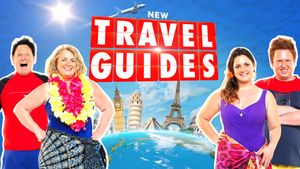
Apply now to be part of Travel Guides 2024
Ever dreamed of becoming a travel critic?
- Credit cards
- View all credit cards
- Banking guide
- Loans guide
- Insurance guide
- Personal finance
- View all personal finance
- Small business
- Small business guide
- View all taxes
You’re our first priority. Every time.
We believe everyone should be able to make financial decisions with confidence. And while our site doesn’t feature every company or financial product available on the market, we’re proud that the guidance we offer, the information we provide and the tools we create are objective, independent, straightforward — and free.
So how do we make money? Our partners compensate us. This may influence which products we review and write about (and where those products appear on the site), but it in no way affects our recommendations or advice, which are grounded in thousands of hours of research. Our partners cannot pay us to guarantee favorable reviews of their products or services. Here is a list of our partners .
How to Become a Travel Agent: Turn Your Passion Into Perks and Cash

Many or all of the products featured here are from our partners who compensate us. This influences which products we write about and where and how the product appears on a page. However, this does not influence our evaluations. Our opinions are our own. Here is a list of our partners and here's how we make money .
Raise your hand if you love to travel. Whether you’re often on the road or take a vacation just once a year, you’ve probably heard of travel agents. These folks help plan and book itineraries for you, eliminating a lot of the pain points when it comes to traveling.
These days many people skip out on a travel agent in lieu of booking their trip online, but if you’re a frequent traveler, you may want to become a travel agent yourself. Why? Because it can save you a lot of money — and may even earn you some in the process.
Let’s take a look at how to become a travel agent, why it’s something you may want to consider and the ways it can work for you.
Why become a travel agent?
Have you ever obsessively researched the best hotels in a city you’re planning to visit? How about checking seat maps on an airplane? If getting into the nitty-gritty of travel logistics is something you do in your spare time, you might also enjoy becoming a travel agent.
Not only do you get to plan trips for others, but you’ll also be able to take advantage of special discounts on many facets of travel.
This is true for your clients, but also for yourself. Travel agents have access to a variety of discounted rates on both airlines and hotels, even when booking travel for themselves.
» Learn more: How to get a refund from a travel agency
How to become a travel agent
Find a program.
Becoming a travel agent isn’t as simple as declaring yourself one. Typically, the first step is to sign up for a program that’ll teach you the basics of running your own travel business.
There are a variety of programs to choose from, depending on your interests and career goals. Most programs will teach you about the business side of being a travel agent as well as how to plan trips, so your courses in itinerary planning and travel insurance will be coupled with business ethics and customer service.
If you’re wondering how to become a travel agent from home, don’t worry. Many of these courses don’t have to be done in person; there are online programs that will teach you everything you need to know from the comfort of your living room.
Apply for certification
Once you’ve completed your coursework, you’ll want to apply for certification. Although there is no single standard that designates you a travel agent, there are a number of different identifiers that you can acquire. Some of the more common ones are:
International Air Transport Association, or IATA, which allows you to book travel on domestic and international airlines.
Travel Industry Designator Service, or TIDS, which allows agents to book trips with a variety of travel suppliers and receive commissions.
Cruise Lines International Association, or CLIA, which provides agents the ability to book trips on cruises around the world.
In order to access Marriott’s travel advisor rates, for example, you can use any three of these designations, along with a variety of others.
Each of these associations and identifiers have different implications for your business, so you’ll want to be sure you’ve fully researched them before applying for membership.
» Learn more: Do travel agents really save you money?
Save money as a travel agent
Once you’ve qualified as a travel agent, what comes next? If you travel frequently, becoming a travel agent can be a huge benefit to you, as it offers discounted rates and access to luxury travel options.
Discounted rates
Travel agents have access to negotiated rates that aren’t available to the general public. The exact amount will vary depending on the business. Hilton, for example, will give personal travel discounts of 50% off at newly-opened hotels and up to 25% off at the remainder of hotels within Hilton’s portfolio.
Hyatt, meanwhile, will give you a discount on personal travel of up to 50%, but only during select dates of the year. And although not all airlines give discounts to travel agents, many do.
Regardless, these are some pretty spectacular savings, and if you’re looking to save money on your vacations, being a travel agent can help.
Luxury programs
Becoming a travel agent isn’t only about saving money, however. It also grants you access to many hotel chains’ luxury travel programs.
If you’re big into elite status benefits, this is definitely something you’ll want to consider — especially since you don’t need any status at all to receive these perks, as long as you book through the hotel’s agent portal.
Most major hotel chains have these programs, including Hyatt Privé, Hilton Impresario, Marriott STARS & Luminous, Four Seasons Preferred Partner, Belmond Bellini Club, Rosewood Elite, Mandarin Oriental Fan Club and Shangri-La Luxury Circle.
While benefits vary by brand, many of these offers include things like room upgrades, complimentary breakfast, early check-in or late checkout and credits for expenses like dining or spa services. General consumers aren’t eligible for these programs, but once you’ve become a registered travel agent, they become accessible to you; however, some programs — such as Hyatt Privé — are invitation only.
For the most part, booking rooms through these programs shouldn’t cost more than the standard rate you’d be paying anyway, so you have the potential to get big benefits without shelling out any additional money.
However, note that these numbers don’t take into account any other discounted rates for which you may be eligible, such as those offered to American Automobile Association members and veterans .
» Learn more: Uncommon tips for saving money on travel
Earn money as a travel agent
Of course, becoming a travel agent isn’t all about scoring discounts for yourself. If you’re looking to earn some money, being a travel agent can be a good way to do so.
Note that travel agents operate in a customer-facing role, so you’ll also need to be able to build client relationships and be comfortable with sales. Courses such as those mentioned above can help train you to do this and run a successful business.
If booking travel and organizing trips for others is something that appeals to you, there’s definitely money to be earned. Marriott, for example, gives agents a commission of between 8% and 10% for all eligible stays booked.
» Learn more: The pros and cons of booking through online travel agencies
If you’d like to become a travel agent
There are a few good reasons to become a travel agent, especially if you travel a lot. Although it takes time and effort to complete training and apply for accreditation, the benefits you’ll receive as a travel advisor can be significant. This is true whether you’re booking personal travel or have built yourself a client base. Either way, there’s money to be had — and saved.
How to maximize your rewards
You want a travel credit card that prioritizes what’s important to you. Here are our picks for the best travel credit cards of 2024 , including those best for:
Flexibility, point transfers and a large bonus: Chase Sapphire Preferred® Card
No annual fee: Bank of America® Travel Rewards credit card
Flat-rate travel rewards: Capital One Venture Rewards Credit Card
Bonus travel rewards and high-end perks: Chase Sapphire Reserve®
Luxury perks: The Platinum Card® from American Express
Business travelers: Ink Business Preferred® Credit Card

on Chase's website
1x-5x 5x on travel purchased through Chase Travel℠, 3x on dining, select streaming services and online groceries, 2x on all other travel purchases, 1x on all other purchases.
60,000 Earn 60,000 bonus points after you spend $4,000 on purchases in the first 3 months from account opening. That's $750 when you redeem through Chase Travel℠.

1.5%-6.5% Enjoy 6.5% cash back on travel purchased through Chase Travel; 4.5% cash back on drugstore purchases and dining at restaurants, including takeout and eligible delivery service, and 3% on all other purchases (on up to $20,000 spent in the first year). After your first year or $20,000 spent, enjoy 5% cash back on travel purchased through Chase Travel, 3% cash back on drugstore purchases and dining at restaurants, including takeout and eligible delivery service, and unlimited 1.5% cash back on all other purchases.
$300 Earn an additional 1.5% cash back on everything you buy (on up to $20,000 spent in the first year) - worth up to $300 cash back!

on Capital One's website
2x-5x Earn unlimited 2X miles on every purchase, every day. Earn 5X miles on hotels and rental cars booked through Capital One Travel, where you'll get Capital One's best prices on thousands of trip options.
75,000 Enjoy a one-time bonus of 75,000 miles once you spend $4,000 on purchases within 3 months from account opening, equal to $750 in travel.

Top 11 Tour Guide Certifications
Updated July 12, 2023 18 min read
Certifications are important for a tour guide in the job market because they help to demonstrate their knowledge and qualifications. Certifications show employers that they have the necessary skills and expertise to provide quality service. They also help to differentiate them from other applicants who may not have the same level of experience or qualifications. Certification can also help tour guides gain more confidence when dealing with clients and potential employers, as it provides recognition for their hard work and dedication to the profession.
The purpose of this article is to review the top certifications for Tour Guides and explain how they can help advance a tour guide's career.
What are Tour Guide Certifications?
Tour guide certification is a process that certifies an individual as a qualified and knowledgeable tour guide. Through the certification process, individuals can demonstrate that they have the knowledge, skills and experience needed to provide tours in a safe and professional manner. The certification process involves taking classes in tourism, customer service, cultural sensitivity, local history and other relevant topics. In addition to providing tangible credentials, tour guide certification also helps to ensure that tour guides are up-to-date on the latest travel regulations and safety guidelines.
Certified tour guides can help make sure tourists get the most out of their trip by providing them with accurate information about destinations. Tour guides can provide insight into local customs, culture and cuisine as well as offer assistance with selecting restaurants or attractions or finding the best deals on accommodations. Certified tour guides can also help make sure travelers stay safe by alerting them to any potential risks associated with certain areas or activities. By having a reliable source of information available for travelers, certified tour guides can help ensure that tourists have a positive experience during their travels.
Pro tip: Look for tour guide certification programs that offer a combination of classroom instruction, hands-on field experience, and online learning. This will ensure you get the most comprehensive training possible to become a successful tour guide.
Related : What does a Tour Guide do?
Here’s our list of the best certifications available to Tour Guides today.
1. Certified Tour Guide (CTG)
Certified Tour Guide (CTG) is a professional designation for individuals who have completed an accredited training program and passed a certification exam. It is designed to ensure that tour guides possess the knowledge and skills necessary to provide safe, enjoyable, and educational tours.
The length of time it takes to get certified as a tour guide varies depending on the specific program chosen. Most programs require completion of a certain number of hours of instruction, which can range from 40-100 hours depending on the program.
To become certified as a tour guide, individuals must first complete an approved training program. These programs are offered by various organizations throughout the country and may include classroom instruction, field trips, and hands-on experience. After completing the required coursework, individuals must pass a written exam in order to receive their certification.
The cost of becoming certified as a tour guide varies depending on the specific program chosen. Generally speaking, most programs cost between $500-$1,000. This cost includes tuition fees, materials needed for the coursework, and any additional costs associated with taking the certification exam.
2. Certified Professional Tour Guide (CPTG)
Certified Professional Tour Guide (CPTG) is a certification program for professional tour guides. This certification program was created to recognize and promote the highest standards of professionalism and quality in the tour guiding industry. It is designed to ensure that tour guides are providing their clients with a safe, enjoyable and educational experience.
The CPTG certification process includes an online application, a written exam, an interview and a practical assessment. The written exam consists of questions about customer service, tour planning, cultural sensitivity and other topics related to being a professional tour guide. The practical assessment requires candidates to demonstrate their ability to lead tours in different settings.
It typically takes around six months to complete the CPTG certification process. Candidates must submit their applications at least three months before they plan on taking the written exam or practical assessment.
The cost of obtaining CPTG certification varies depending on where you live, but it usually ranges from $300-$500 USD. This cost covers the application fee, exam fee and any additional materials needed for the assessment process.
3. Certified Tourism Ambassador (CTA)
Certified Tourism Ambassador (CTA) is a program that recognizes individuals who have demonstrated knowledge and understanding of the tourism industry. The program is designed to recognize those who have made a commitment to promoting their city or region as a tourist destination.
The CTA program is offered by Destination Marketing Association International (DMAI). It consists of an online training course and an in-person exam. The online course covers topics such as customer service, hospitality, marketing, and event planning. Once the online course has been completed, individuals must pass an in-person exam to become certified.
It typically takes about six weeks to complete the CTA program. Individuals can register for the program on the DMAI website and pay a fee of $175 USD. After registering, they will be given access to the online course materials and will be able to schedule their in-person exam at a local testing center.
Once individuals have successfully passed the exam, they will receive their official CTA certificate from DMAI and be recognized as Certified Tourism Ambassadors.
4. Certified Interpretive Guide (CIG)
A Certified Interpretive Guide (CIG) is a professional designation for those who are knowledgeable about natural and cultural resources, and who have the skills to interpret these resources to visitors. The CIG program is offered by the National Association for Interpretation (NAI), a professional organization dedicated to promoting excellence in interpretation.
To become certified as an interpretive guide, applicants must complete a comprehensive training program that covers topics such as communication techniques, visitor services, resource management, and interpretation planning. The program typically takes between 6-12 months to complete depending on the individual's background and experience.
The cost of certification varies depending on the type of training program chosen, but can range from $500-$2,000 or more. In addition to the cost of the training program itself, there may be additional costs associated with travel expenses and other materials required for certification.
Once an individual has completed their training program and passed all necessary exams, they will be eligible to apply for certification through NAI. Upon approval of their application, they will receive their official CIG certificate and become part of NAI's network of certified interpreters.
5. National Association for Interpretation (NAI) Certification
The National Association for Interpretation (NAI) Certification is a professional credential that recognizes individuals who have demonstrated a high level of knowledge and experience in the field of interpretation. It is designed to help professionals advance their careers and provide them with recognition from peers, employers, and the public.
NAI Certification requires applicants to demonstrate their knowledge of interpretation practices through a written exam. The exam covers topics such as natural history, cultural history, communication skills, visitor services, and resource management. Applicants must also submit evidence of their professional experience in the field of interpretation.
The process for obtaining NAI Certification typically takes about six months. After submitting an application, applicants are required to take the written exam within three months. Once they pass the exam, they must submit evidence of their professional experience within another three months in order to receive certification.
The cost of obtaining NAI Certification varies depending on the applicant’s individual circumstances. Generally speaking, it costs around $500-$600 to apply for certification and take the written exam. Additional fees may be required if an applicant needs to retake the exam or if they require additional documentation or verification of their professional experience.
6. American Alliance of Museums Accreditation Program
The American Alliance of Museums (AAM) Accreditation Program is a rigorous process that assesses the operations and programs of museums against standards developed by the museum field. The program is designed to ensure that accredited museums are operating at a high level of excellence, providing quality services to the public, and managing their collections responsibly.
The accreditation process takes approximately two years from start to finish. During this time, museums must complete an extensive self-study report and host an on-site visit by a team of trained professionals. This team then makes a recommendation to the AAM Accreditation Commission based on its findings. If approved, the museum will be granted accreditation for five years.
To apply for accreditation, museums must first become members of AAM and then submit an application form along with supporting documentation such as financial statements, organizational charts, and policies and procedures. They must also pay an application fee which varies depending on the size of the museum.
Once accepted into the program, museums must complete their self-study report within one year. This document should include information about all aspects of their operations including governance, collections management, education programs, finances, security systems, visitor services and more. After submitting this report they will be assigned an on-site review team who will evaluate their operations in person over two days or more.
At the end of this process, if approved by the AAM Accreditation Commission, the museum will receive its official accreditation certificate and can use AAM’s logo in promotional materials to demonstrate its commitment to excellence in museum practice.
7. American Bus Association Certified Tour Professional
The American Bus Association Certified Tour Professional (CTP) is a professional certification program for individuals in the group travel and tour industry. It is designed to recognize professionals who have demonstrated knowledge, skills, and expertise in the areas of customer service, safety, sales and marketing, operations, finance, and administration.
It typically takes about six months to complete the CTP program. The program consists of an online self-study course and a final exam. The cost of the program is $395 USD plus applicable taxes.
To get started with the CTP program, you must first register online at www.buses.org/ctp. After registering, you will be given access to the CTP course material which includes videos, audio recordings, webinars, and other resources that cover all aspects of group travel management. Once you have completed the course material and passed the final exam with a score of 80% or higher, you will receive your official CTP certificate from ABA.
8. International Guide Academy Certification
The International Guide Academy Certification (IGA) is a professional certification program designed to provide aspiring tour guides with the skills and knowledge necessary to become successful professionals in the tourism industry. The program is offered through the International Guide Academy, an organization that provides comprehensive training for prospective tour guides.
The IGA certification consists of two components: a comprehensive online course and an on-site field experience. The online course covers topics such as customer service, cultural sensitivity, safety and security, and regional information. It also includes interactive activities and quizzes to help participants learn and retain the material. The on-site field experience is designed to give participants hands-on experience in leading tours, working with customers, and dealing with different types of travelers.
The IGA certification typically takes between 6-12 months to complete depending on how quickly participants progress through the coursework. To get certified, applicants must first complete the online course followed by an on-site field experience at one of several approved locations around the world. Once both components are completed, applicants can submit their application for review by IGA’s panel of experts who will evaluate their performance and award them with the IGA certification if they meet all requirements.
The cost of obtaining the IGA certification varies depending on where you take your courses and field experiences. Generally speaking, it can cost anywhere from $500-$2000 USD or more depending on location and duration of study.
9. International Ecotourism Society Certification
The International Ecotourism Society (TIES) Certification is a voluntary certification program that recognizes ecotourism businesses and organizations that meet the highest standards of sustainability, conservation, and community engagement. The certification process is designed to ensure that certified ecotourism operators are providing quality experiences while protecting the environment and local cultures.
The TIES Certification process takes approximately six months to complete. To begin the process, applicants must fill out an online application form and submit it along with supporting documents such as a business plan, environmental impact assessment, and financial statements. After submitting the application, TIES staff will review it for completeness and accuracy before proceeding to the on-site audit. During the audit, TIES staff will assess the applicant’s operations against TIES’ criteria for sustainable tourism practices. If all criteria are met, then a certificate of compliance will be issued.
The cost of obtaining TIES Certification varies depending on the size of the business or organization applying for certification. Generally speaking, smaller businesses can expect to pay around $2,500 USD for certification while larger businesses may pay up to $10,000 USD or more.
In addition to obtaining certification from TIES, applicants must also commit to ongoing monitoring and reporting requirements in order to maintain their certification status over time. This includes submitting annual reports on their operations as well as periodic audits by third-party auditors appointed by TIES.
10. Adventure Travel Trade Association Certification
The Adventure Travel Trade Association (ATTA) is a global network of adventure travel professionals dedicated to promoting responsible, sustainable, and ethical adventure travel. The ATTA Certification program was created to recognize and reward those individuals who have demonstrated a commitment to the highest standards of excellence in their field.
The ATTA Certification program requires applicants to complete a comprehensive application process that includes an assessment of their knowledge and experience in the adventure travel industry. Applicants must also demonstrate their commitment to responsible tourism practices through a series of case studies. After completing the application process, applicants must pass an exam that covers topics such as sustainability, safety, risk management, customer service, and marketing.
The ATTA Certification program takes approximately two months to complete from start to finish. The cost for the certification is $395 USD for members of the ATTA or $495 USD for non-members. To apply for certification, applicants must first create an account on the ATTA website and then submit their application materials online. Once approved by the ATTA review board, applicants will be required to pay the certification fee before taking the exam.
Upon successful completion of all requirements, applicants will receive their official ATTA Certification certificate and be listed in the official directory of certified professionals on the ATTA website. This listing serves as evidence that they have met all requirements for certification and can serve as proof of expertise when applying for jobs or contracts within the adventure travel industry.
11. Cruise Line International Association Cruise Director Certification
The Cruise Line International Association (CLIA) Cruise Director Certification is a professional certification program designed to recognize and reward cruise directors who demonstrate the highest level of professionalism, knowledge, and customer service. The certification is valid for two years and requires renewal every two years.
To become certified, applicants must complete a minimum of 80 hours of CLIA-approved training courses in areas such as customer service, hospitality management, safety and security, and cruise operations. Applicants must also pass an examination that covers topics including passenger relations, onboard activities and entertainment, shore excursions, health regulations, and emergency procedures.
The cost of the certification varies depending on the chosen course provider; however it typically ranges from $500 to $2,000. The cost includes the exam fee as well as any additional fees associated with the course provider.
Once certified, cruise directors are required to maintain their certification by completing at least 20 hours of continuing education credits during each two-year period. Credits can be earned through attending seminars or workshops related to cruise operations or taking online courses offered by CLIA-approved providers.
Do You Really Need a Tour Guide Certificate?
Yes, you do need a Tour Guide Certificate if you want to work as a tour guide. Tour guides help people explore their destination and interact with the locals. They provide information on the local culture, history, attractions, and more. Without a certificate, potential employers may not take your application seriously or consider you for the job.
Having a Tour Guide Certificate shows that you have the necessary knowledge and skills to guide tourists around a destination. It demonstrates that you understand the importance of safety, customer service, and cultural sensitivity when dealing with clients from different backgrounds. It also shows that you are up to date on local regulations and laws in regards to tourism.
The certificate is an important step in becoming a successful tour guide because it sets you apart from others who may not have taken the time to get certified. It gives potential employers confidence in your abilities because they know that you have gone through the necessary training to become qualified for the job.
The certification process varies depending on where you live and what type of tour guide position you are looking for. In some places, there are government-issued certificates while other places require applicants to complete courses or workshops before being eligible for certification. You can find out more about these requirements by researching online or contacting local tourism organizations or travel agencies in your area.
In conclusion, having a Tour Guide Certificate is essential if you want to work as a tour guide because it demonstrates your commitment and knowledge of the industry as well as sets you apart from other applicants.
Related : Tour Guide Resume Examples
FAQs About Tour Guide Certifications
1. What qualifications do I need to become a tour guide?
Answer: Most tour guides will have at least a high school diploma or equivalent and must be knowledgeable about the area they are guiding tours in. Depending on the country, additional certifications may be required, such as first aid and CPR certifications.
2. How can I obtain a tour guide certification?
Answer: There are various ways to obtain a tour guide certification depending on the country you live in. Some countries offer government-approved courses that you can take to become certified, while other countries may require you to take an exam or provide proof of your knowledge of the area you will be guiding tours in.
3. Is there an age limit for becoming a tour guide?
Answer: Generally speaking, there is no age limit for becoming a tour guide as long as you meet all other requirements (such as having a high school diploma or passing an exam). However, some countries may have specific regulations regarding the minimum age of tour guides.
4. How much does it cost to get certified as a tour guide?
Answer: The cost of obtaining a tour guide certification varies depending on the type of certification and country you live in. Generally speaking, it can range from around $50-$500 USD depending on the country and type of certification needed.
5. Are there any online courses available for becoming a certified tour guide?
Answer: Yes, many countries offer online courses or programs that allow individuals to become certified as professional tour guides from their own home or office. These programs often include educational materials, video tutorials, practice exams, and even mentorship opportunities with experienced professionals in the field.
Editorial staff
Brenna Goyette
Brenna is a certified professional resume writer, career expert, and the content manager of the ResumeCat team. She has a background in corporate recruiting and human resources and has been writing resumes for over 10 years. Brenna has experience in recruiting for tech, finance, and marketing roles and has a passion for helping people find their dream jobs. She creates expert resources to help job seekers write the best resumes and cover letters, land the job, and succeed in the workplace.
Similar articles
- Top 16 Tour Guide Resume Objective Examples
- What does a Tour Guide do?
- Top 11 Tourism Management Certifications
- Top 10 Tour Coordinator Certifications
- Top 10 Tour Manager Certifications
- Top 18 Tour Coordinator Resume Objective Examples

- How to Become a Travel Writer: Complete guide for travelogue writing
- Self Publishing Guide
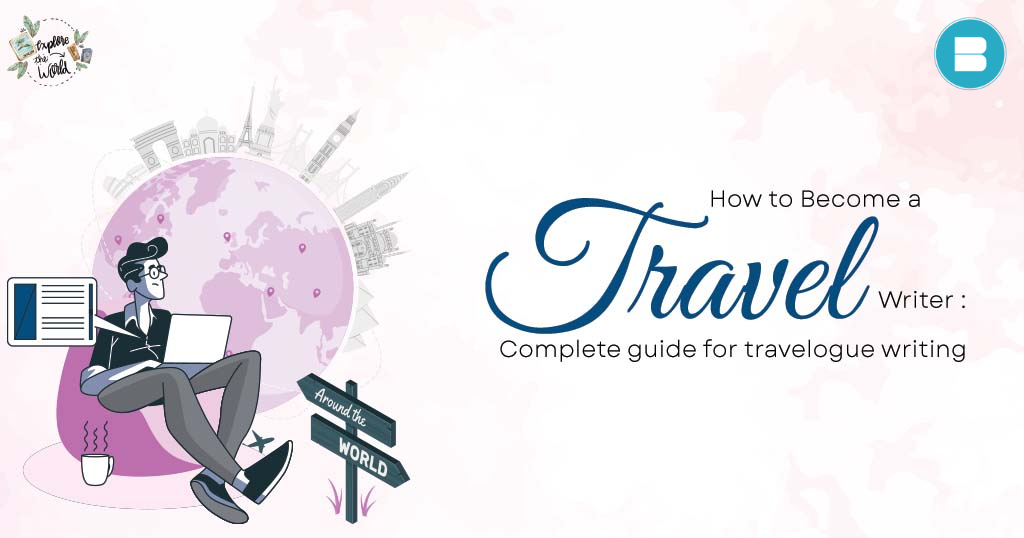
The world is a treasure trove of experiences waiting to be explored and shared, and becoming a travel writer is your passport to capturing and narrating these adventures. If you’ve ever felt the wanderlust in your veins and a passion for storytelling in your heart, then embarking on the path of a travel writer might just be your calling. In this comprehensive guide, we’ll walk you through the intricate art of travelogue writing, offering insights, tips, and a roadmap to help you embark on this exciting journey of words.
Understanding the Role of a Travel Writer
Travel writers embark on journeys that transcend physical landscapes; they immerse themselves in cultures, traditions, and stories that shape the world. Their role is to bring these experiences to life through words, painting vivid pictures for readers who long to discover new horizons. Beyond merely documenting destinations, travel writers craft narratives that transport readers, evoking emotions and sparking a sense of wanderlust. They uncover the hidden stories that breathe life into places, connecting readers to the heart and soul of a locale. Travel writers are not just chroniclers of journeys; they are ambassadors of exploration, inviting others to embark on their own adventures armed with insights and inspiration.
Developing Your Writing Style
In the realm of travel writing, a writer’s style becomes their distinct fingerprint, an expression of their literary personality. This style is the lens through which readers perceive the world you describe. It’s crucial to cultivate a voice that resonates authentically with your experiences and perceptions. Experimentation is key; try on different stylistic garments, from lush, poetic prose to succinct, informative language. Reading a diverse range of travel literature can broaden your horizons and help you pinpoint your comfort zone. Whether you’re crafting a blog post, an article, a book, or a social media update, your style should reflect your genuine self. The more you explore and experiment, the more refined and unique your writing style will become, captivating readers and making your travel tales truly unforgettable.
Mastering the Art of Observation
You may also like: Top 10 Best Biographies of All Time
Choosing Your Niche
In the vast realm of travel writing, finding your niche is like discovering your compass in a labyrinth of possibilities. Your niche isn’t just a subject; it’s your lens for exploring the world. It’s a culinary journey that takes you from street food stalls to Michelin-starred restaurants, or an adventure seeker’s quest for adrenaline in the great outdoors. Your niche sets you apart and lends your writing a distinct perspective. It allows you to delve deep, becoming an expert in your chosen field. Whether it’s sustainable travel, solo backpacking, cultural immersion, or any other passion, your niche shapes your identity as a travel writer and connects you with an audience that shares your interests.
Research: The Backbone of Travel Writing
Behind the enchanting stories of travel writing lies the backbone of thorough research. This groundwork is essential to creating narratives that are not only immersive but also accurate and informative. As you plan your journey, delve into the history and cultural nuances of your destination. Understand the significance of local landmarks, festivals, and traditions. Connect with locals to gather insights that may elude tourists’ eyes. A well-researched travel piece goes beyond surface-level description; it weaves historical context and cultural richness into the narrative tapestry. Research transforms your writing from subjective musings to well-rounded, engaging tales that educate and inspire readers. Just as an architect relies on blueprints, a travel writer relies on research to construct narratives that stand strong, with credibility and authenticity as their pillars.
Crafting Compelling Stories
You may also like: Unlocking Success: How to Sell Books Online Effectively
Honing Your Photography Skills
In the digital age, visuals serve as windows into the worlds you describe. Basic photography skills can be a powerful asset for a travel writer. A well-captured image encapsulates a place’s essence, and a picture truly can speak a thousand words. Learning to frame captivating shots enhances your storytelling. High-quality photos complement your prose, offering readers a visual portal to your adventures. Skillful photography brings authenticity and relatability to your narratives, reinforcing the authenticity of your experiences. Whether it’s a sweeping landscape, a bustling market, or a candid portrait, your photos harmonise with your words to craft a multidimensional story that lingers in readers’ minds.
Building an Online Presence
In the digital landscape, an online presence is the bridge between your words and a global audience. Launching a travel blog or website serves as a portfolio where your stories reside. Here, you showcase your adventures, insights, and expertise. Leverage social media platforms as portals into your journeys—a place to share real-time snippets, behind-the-scenes moments, and reflections. Engage with your readers through conversations, fostering a community that rallies around your explorations. By cultivating this virtual tribe, you forge connections that amplify your impact. An online presence not only helps you reach a wider audience but also becomes a platform for sharing your passion and inspiring others to embark on their own journeys.
Pitching and Networking
Pitching your travel stories is akin to casting a net into the vast sea of publications, aiming to capture the attention of editors and readers. Thorough research is paramount; identify magazines, newspapers, and websites that resonate with your writing style and niche. Tailor your pitches to align with their editorial focus. Craft a succinct yet enticing pitch that highlights the uniqueness of your story and why it’s a perfect fit for their audience. Networking serves as a bridge to these opportunities. Engage with editors, connect with fellow writers, and attend industry events. Building relationships within the travel writing community not only opens doors but also fosters a supportive network where insights, advice, and collaborations flourish, propelling your journey as a travel writer.
Continual Growth and Learning
You may also like: Find the Benefits of Reading Books Online: Beyond the Pages

To embark on writing a travelogue, start by selecting a destination that has left a significant impact on you. Reflect on your experiences, emotions, and observations during the journey. Organise your thoughts and create an outline to structure your narrative. Begin with a captivating introduction that hooks readers and sets the tone for your story. Incorporate vivid descriptions, sensory details, and personal anecdotes to transport readers to the destination. Share cultural insights, interactions with locals, and unique experiences to make your travelogue engaging. Blend your personal perspective with informative content, and wrap up with a reflective conclusion. Remember, authenticity and passion are key to crafting a compelling travelogue that resonates with readers.
Becoming a full-time travel writer requires dedication, skill-building, and strategic steps. Start by honing your writing skills through practise and feedback. Create a professional online portfolio showcasing your travel writing. Pitch your work to travel magazines, blogs, and websites to gain exposure and build a portfolio. Establish a strong online presence through social media platforms and a personal blog. Network with fellow writers, editors, and industry professionals. As your reputation grows, consider reaching out to tourism boards, travel companies, and publishers for collaborations. Diversify your income by offering workshops, speaking engagements, or freelance writing. Consistency, perseverance, and a passion for exploration will pave the way to becoming a successful full-time travel writer.
To excel as a travel writer, you need a combination of skills and qualities. Strong writing skills, including descriptive language, storytelling, and attention to detail, are essential. Curiosity and a love for travel are paramount, as you’ll be exploring new destinations and cultures. Flexibility and adaptability are key to thriving in different environments. Research skills enable you to provide accurate information and historical context. Photography skills can enhance your content and make it more visually appealing. Networking abilities help you connect with editors, fellow writers, and potential collaborators. Finally, resilience and the ability to handle rejection are crucial in the competitive travel writing industry.
Travel writing, also known as a travelogue, is a genre of literature that captures the essence of travel experiences. It involves narrating personal journeys, adventures, and observations from various destinations. Travel writers aim to transport readers to new places, cultures, and landscapes through vivid descriptions, anecdotes, and insights. A well-crafted travelogue not only informs but also inspires readers to explore the world themselves. It can take various forms, including articles, essays, books, and online content, and often combines elements of storytelling, journalism, and creative writing.
Yes, travel writers can make money through various avenues. Freelance travel writers often get paid for articles, blog posts, and content commissioned by magazines, websites, and travel companies. Some travel writers secure book deals, earning royalties from published works. Collaborations with tourism boards, hotels, and brands can also be financially rewarding. Additionally, offering workshops, speaking engagements, and consulting services can generate income. However, income can vary widely based on experience, niche, and the demand for your work. Successful travel writers often have multiple income streams and diversify their offerings to sustain their careers.
You can write a travelogue for various platforms and outlets. Start by creating a blog or personal website where you can share your travel experiences. Submit articles and essays to travel magazines, both print and online. Many websites accept guest posts from travel writers. Consider pitching to travel-focused blogs and online publications. You can also contribute to the travel sections of newspapers and literary journals. Social media platforms, especially Instagram and YouTube, offer opportunities to share micro-travelogues through captions, stories, and videos. Additionally, consider self-publishing travel books or e-books through platforms like Amazon Kindle Direct Publishing.
- About The Author
- Latest Posts
Mansi Chauhan

You May Also Like

Leave a Reply Cancel reply
Your email address will not be published. Required fields are marked *
Save my name, email, and website in this browser for the next time I comment.

- HOME IMPROVEMENT
- REAL ESTATE
- SEO DIGITAL
- ENTERTAINMENT
Top Insights

Journey Through Transformation: Facelift Before and After Experiences

The Impact of Quality Furniture on Home Aesthetics and Personal Well-being

Tips for Handling Home Updates and Repairs

The Top 4 Easy Cash Loan Options for Quick Financial Assistance
The comprehensive guide to becoming a disney travel planner.

If you’re a Disney enthusiast who loves planning trips, becoming a Disney travel agent could be your dream job. Just imagine merging your extensive knowledge and passion for all things Disney with the incredibly fulfilling opportunity to assist others in creating enchanting memories that will last a lifetime.
This comprehensive guide has been meticulously curated to provide you with the necessary knowledge to embark on an exhilarating journey as a Disney travel planner. Its main objective is to provide vital information while ensuring clarity, coherence, and a captivating reading experience.
Gain invaluable insights and master the art of crafting bespoke itineraries. Explore the intricacies of this remarkable industry, where dreams transform into reality, and boundless possibilities await. Prepare to unlock a world of opportunities as a Disney travel planner .
Table of Contents
What Does a Disney Travel Planner Do?
A Disney travel planner offers clients personalized services, attending to every detail of their trip. They provide expert guidance on the optimal time to visit and assist in selecting the perfect resort.
From securing dining reservations to arranging FastPass+ options, they meticulously craft daily itineraries. Their ultimate goal is to make the planning process stress-free and ensure their clients have an unforgettable Disney vacation .
Ultimate Guide to Becoming a Disney Travel Planner
1: immerse yourself in all things disney.
To embark on a journey of becoming a Disney travel planner, it is vital to foster a profound grasp of all things Disney. Immerse yourself in the enchantment by exploring the parks, staying at the resorts, and indulging in delightful dining experiences. This firsthand knowledge will prove invaluable as you guide your clients, ensuring their magical experiences are truly unforgettable .
2: Complete Disney’s Training Program
Disney provides an online training program known as the College of Disney Knowledge. This program offers comprehensive training on various Disney destinations, such as Disneyland, Walt Disney World, Disney Cruise Line, and Adventures by Disney. Completing this training is a significant milestone for aspiring Disney travel agents, equipping them with essential expertise and knowledge.
3: Join a Travel Agency
Once you have completed your training, you can join a travel agency specializing in all things Disney. These agencies often offer attractive commission splits, making them an enticing choice for aspiring agents.
Strategies That Work: Unlocking Success as a Disney Travel Planner
1: stay updated.
A Disney travel planner must consistently stay informed about newly introduced attractions and promotions to deliver exceptional service to clients. This ensures they are always up-to-date and can offer the most extraordinary experiences possible.
2: Prioritize Customer Service
Delivering outstanding customer service is paramount in this industry. It is crucial to be prompt, attentive, and go above and beyond to ensure your clients have an unforgettable Disney vacation experience.
Connecting with fellow travel agents and industry professionals can offer priceless insights and open doors to thrilling opportunities. Furthermore, it serves as an exceptional avenue for staying updated on the latest trends and advancements in the industry.
The Comprehensive Guide To Becoming a Disney Travel Planner- In Conclusion
A career as a Disney travel planner can be both advantageous and fulfilling for individuals who have an unwavering passion for Disney and a genuine desire to help others plan their dream vacations.
Experience the magic of transforming Disney dreams into reality for enthusiasts worldwide. Embark on an enchanting adventure as a Disney travel planner, opening doors to a realm teeming with boundless opportunities. Start your journey today and unlock a world of wonder and possibility.

You May Need:
Recent posts.

Transforming Lives, One Home at a Time: Exceptional Home Health Care Services

The Ultimate Guide to Choosing the Right Roofing Contractor for Your Home

The Complete Wellness Experience: Exploring Our Clinic’s Range of Therapeutic Services

Residential Construction Projects: Meeting Housing Needs in Growing Cities
- BUSINESS 485
- CONSTRUCTION 38
- CRYPTOCURRENCY 18
- EDUCATION 110
- ENTERTAINMENT 373
- FASHION 105
- FINANCE 115
- HOME IMPROVEMENT 448
- LIFESTYLE 320
- REAL ESTATE 99
- SEO DIGITAL 17
- Uncategorized 3
Related Articles

Top 5 Digital Marketing Strategies for 2024
The 21st-century business arena is digital, which means every player invests heavily...

Harnessing the Power of Technology: Essential Tools for Business Success
Technology is the key to success in today’s ever-changing business environment because...

Enhancing Your Rental Business with Professional Landlord Services
Are you looking to make your rental business more successful? Professional landlord...

A Guide to Selling Fabric and Sewing Supplies Online
With the click of a button, enthusiasts can access a treasure trove...

From Dreamer to Explorer: How to Become a Travel Content Creator
Imagine having the world as your office. Wouldn’t it be great? If the thought of leaving your 8 to 5 PM job to become a travel content creator sounds like a plan, you’re on the right track!
This guide will be your map and best ally to turning your travel passion into a profitable and successful career. So, let’s spill the details on how to make it happen!
Explore These Travel Templates Hundreds of Freebies for Your Project! Get Freebies
What’s on this bucket list ✈, what is a travel content creator, 1. pick a niche and sub-niche to specialize in, 2. create a personal brand for yourself, 3. select your platforms to establish your online presence, 4. produce consistent and top-notch content, 5. learn how to monetize your content to find a profitable way of living, 6. network and collaborate with travel partners and other creators, and that’s a wrap.
A travel content creator is someone who specializes in producing content for various platforms, including apps, blogs, and videos, with a strong focus on travel.
Whether it’s sharing personal travel experiences, offering tips, or showcasing different destinations, you can turn your passion into a source of income by creating travel content.
As a travel content creator, your main tasks will involve:
- Researching and developing new content ideas within the travel industry.
- Crafting and proofreading content for blogs, social media, video scripts , podcasts, infographics, and more.
- Editing and creating eye-catching graphics, photos, and videos.
- Producing audio content, whether in the form of podcasts or voiceovers.
- Managing and maintaining active social media accounts and a travel-focused blog.
- Analyzing content performance and metrics to gain insights into its effectiveness.
- Exploring opportunities for monetization to generate a sustainable income. We’ll delve deeper into this later on. 😉
🌟 Main Goal
Your primary objective is to provide value (through content) by inspiring, informing, entertaining, educating, and engaging with people who share a love for travel.
Your role involves creating highly engaging content, whether through the written word, audio, or video, to help others plan their trips, discover new destinations, make informed travel decisions, and contribute to promoting tourism and exploring diverse cultures worldwide.
💡 Related Concepts to Look At
You might wonder if a travel content creator is the same as a travel blogger or influencer. While they’re closely related, there are some key differences. Let’s take a closer look at each:
Travel Blogger
Typically, a travel blogger specializes in creating written travel content through a blog or website. In this format, the author shares their views and provides insights into travel experiences, tips, destinations, recommendations, stories, itineraries, reviews, and more.
Travel Influencer
On the flip side, a travel influencer primarily focuses on social media platforms like Instagram, TikTok, or Pinterest to create content. Their main goal is to influence people through their travel experiences and promote products/services related to accommodations, airlines, tourism boards, and cities.
Zero to Pro: 6 Steps to Becoming a Content Travel Creator
To be successful, you need to play your cards right. When you do it right, it’s very likely that by this time next year, you could find yourself working from the stunning landscapes of Australia or crafting captivating content about Ireland. The key to achieving these dreams is planning and having a structured approach.
So, love traveling and want to live from it: ✅ checked. Now, let’s move on to the next steps.
The first step in your exciting journey as a travel content creator starts here, yay! This is the most important step since all your content and work opportunities will revolve around it.
In other words, your niche and sub-niche will determine what kind of travel content creator you will be.
Here are some of the most popular travel niches. Read on and choose wisely; later, you’ll become the go-to guru for this niche. 😉

✨ Luxury Travel
As its name suggests, this niche focuses on top-notch travel experiences. From luxury destinations, 5-star hotels, and resorts to Michelin-starred restaurants, exclusive transportation, and activities.
Some of its sub-niches include luxury cruises, high-end resorts, and gourmet dining. So, if you’re ready to enjoy a luxurious life while traveling, this is your niche!

🚶 Solo Travel
When it comes to solo travel content creators, they’re undoubtedly brave souls! If you choose this niche, get ready to explore the world on your own, uncover hidden gems, share tips on staying safe, and discover yourself along the way.
Sub-niches within this category include solo female travelers, adventure seekers, and budget travelers.

🤑 Budget Travel
These content creators are money-saving gurus, proving that traveling and exploring the world on a small budget is possible. Including low-cost destinations, accommodations, transportation, and activities. Who said world exploration can’t be accessible to everyone?
The main sub-niches within this budget travel category are backpackers, travelers specializing in hostels, and budget-friendly places. So, if you’re under a tight budget, this might be the great niche to start in.

👨👩👧👦 Family Travel
Unlike solo adventurers, these awesome content creators are like the real-life “Cheaper by the Dozen” squad! Following the “better together” mindset, they focus on crafting content and discovering destinations, activities, and accommodations that cater to every family member—considering that safety and fun are their top priorities.
Within the family travel niche, you’ll find various sub-niches, including specialists in traveling with kids, single parents, and multigenerational families.

🤠 Adventure Travel
Are you a thrill-seeker at heart? Look no further! This is the niche to choose for all the adrenaline enthusiasts out there. These intrepid travelers fully embrace life by seeking adventurous destinations and unforgettable experiences.
The most popular sub-niches in this category focus on extreme activities, outdoor adventures, and sports.

🍉 Food Travel
Are you a foodie with a passion for travel? Then, the food traveler category is tailor-made for you! Food travel content creators specialize in exploring a world of flavors, whether it’s through street food or fine dining, while also uncovering culinary traditions and unknown food paradises.
If you’re ready to savor the best of both worlds, you can choose from these sub-niches: street food, gourmet dining, or wine routes.
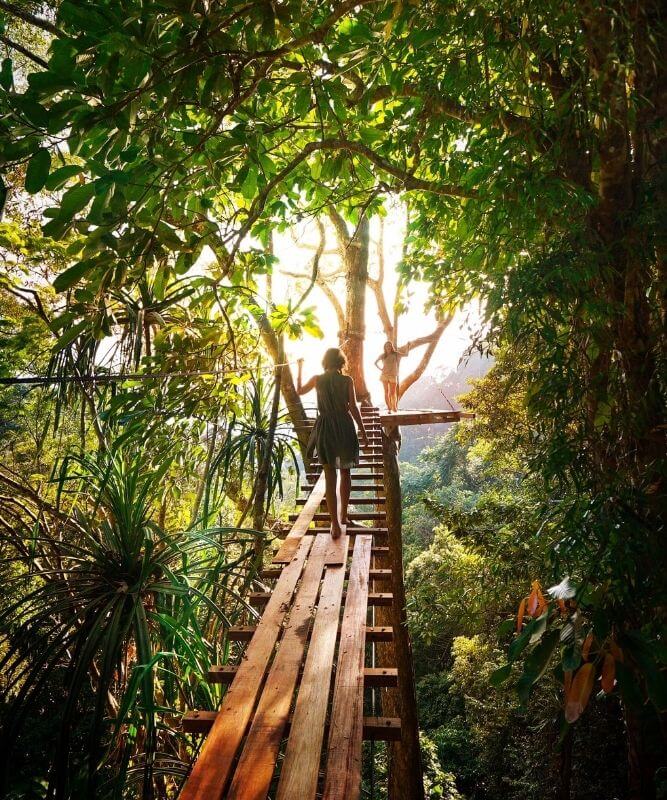
🌱 Eco-Friendly Travel
We know that travel can leave a mark on our planet. But there’s this travel niche for those who love travel and focus on Earth preservation. This proves you can explore the world while being a responsible Earth steward.
Within this category, you’ll discover green sub-niches—for example, wildlife conservation, sustainable tourism, and eco-friendly adventures.

🤓 Cultural Travel
Art and culture enthusiasts who love traveling, this one’s for you! This type of travel focuses on discovering the world through culture, art, people, traditions, and historical landmarks.
In this niche, you’re not just exploring the world but delving into more than just its physical beauty. You get to create content that’s not only engaging but also incredibly informative, revealing the hidden facets of the world’s most popular destinations.
Plus, within the sub-niches for this category, you can opt for specializing in historical sites, cultural immersion, and arts or traditions.
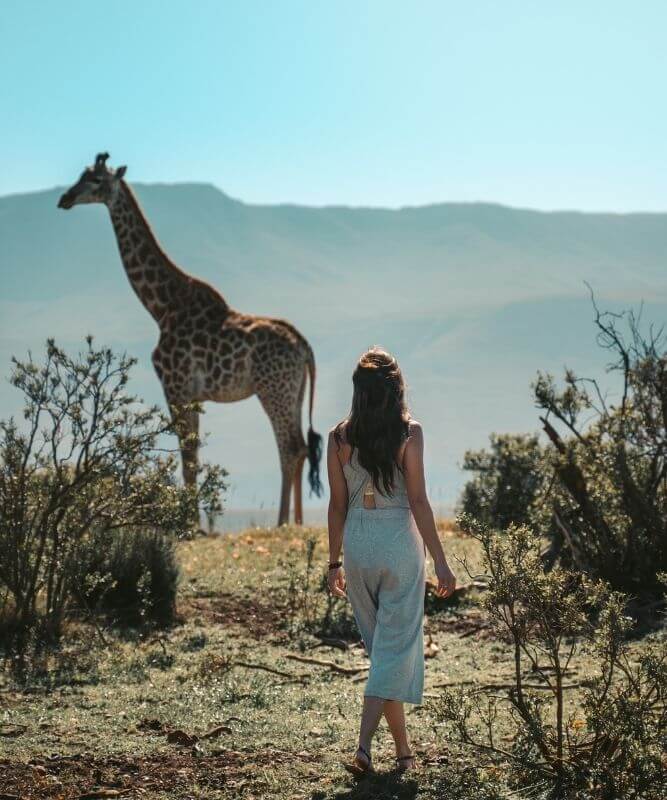
🦁 Wildlife Travel
Now it’s time to see the world in real life and admire the beauty of the wildlife. These travel content creators have a strong passion for animals and nature. It’s common to find them exploring national parks, going on safaris, visiting wildlife sites, and simply discovering the natural wonders of our living planet.
To become an expert, dive into the Safaris, Underwater life, and Birdwatching sub-niches.

🧙♂ Supernatural Travel
If you’re seeking a spooktacular job while exploring the world, this niche might be the perfect fit for you. It specializes in paranormal experiences, including exploring abandoned houses, cemeteries, public places, and more enchanted spots worldwide.

💑 Couple/Romantic Travel
Calling all DINKs (dual income, no kids) who are in love with love! They often specialize in adventures and dreamy romantic destinations for couples. For instance, The Alcalloughbys are a world expedition couple sharing breathtaking destinations.
🌴Location as a Sub-Niche Too!
Seeing the array of travel niches and sub-niches gives you a lot of possibilities to choose from.
So, after reviewing the most popular travel niches and sub-niches, you might know the best category for you as a travel creator. But hey, there’s more (about sub-niches), and it’s all about location!
For example, if you’re a solo female traveler, you could be zooming in on all things Southeast Asia or exclusively exploring the wonders of the US. Or even start in your city and live life like a tourist.
The possibilities are endless, but it’s essential to understand what you want and make it clear from the beginning for you to make everything easier. 🙌
Once you’ve picked your niche and sub-niche, it’s time to start touching down some concepts related to you as a travel brand.

🕵🏼Identify Your Target Audience
Understanding your audience is the core of your success as a travel content creator! Therefore, to connect with your viewers and craft content that truly resonates with them, the key is creating buyer personas representing your target audience.
Start by asking yourself essential questions about your audience. For example, their age, location, lifestyle, personality, interests, habits, needs, and preferred online platforms. You can even go a step further and create detailed personas, giving these “characters” names and faces to make them feel real. 😉
This in-depth audience analysis is the secret sauce that will help you create content that meets their specific needs and desires, making your content engaging and valuable . After all, your audience is a big part of your growth as a travel content creator.
⭐ Develop Your Brand Identity
Let’s talk about building your captivating brand identity as a travel content creator! Think of it like this: your brand identity is what sets you apart, makes you irresistible, and keeps you relevant in the world of travel content.
✏ So, grab your notepad and get ready to establish your:
💡 Value proposition. What makes you different from other travel creators in the same niche or sub-niche you are? For this section, you must look for other travel creators and identify their strengths and weaknesses. This will give you an idea and help identify gaps or uncovered needs in the selected travel niche market. Also, apply our above steps about niches and target audiences, as they’ll be your guiding stars.
🌟 Personality . As you’re the travel content creator, you’d need to list the three adjectives you want to be associated with. Additionally, consider what will be the tone of your brand. Your brand’s tone sets the stage for your content. Whether casual, humorous, or respectful.
🏷️ Your brand’s name. Here’s where you get creative! Your brand name can be your name, last name, or even a clever play on words. Just make sure it’s short, memorable, and not taken.
🌈 Visual identity. This is probably one of the most fun parts as we’re going to develop your visual style, AKA travel graphics. Here is all about color schemes , font pairings , your logo , and other assets for your brand. For instance, your Instagram aesthetic , Pinterest pins, travel itineraries, your travel portfolio – you name it!
Luckily, our talented Placeit by Envato team of designers has designed templates for travel content creators like you to make this easier than ever.
Take a look at some travel templates that you’ll love.
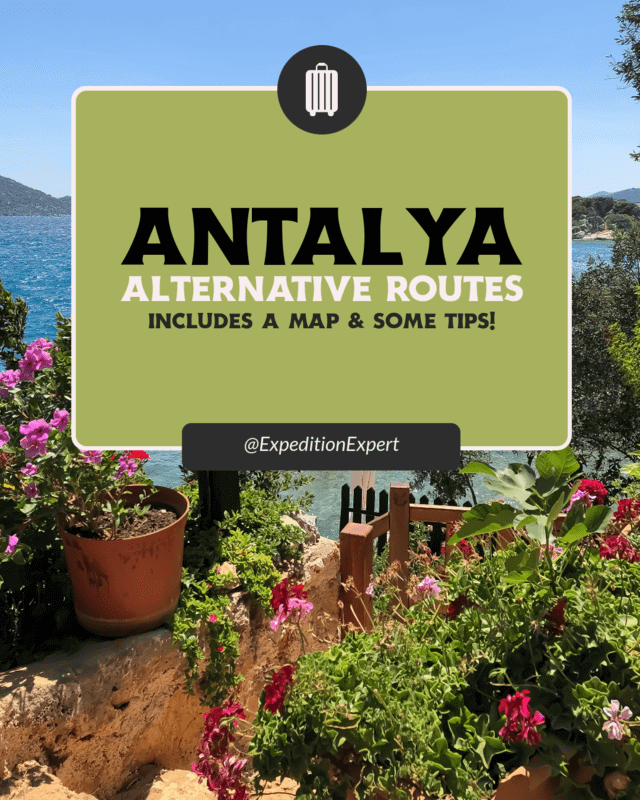
🌍 Take your inspo up a notch with this travel marketing guide for content creators! Learn how to create the best strategy for your brand and boost your social media. 🚀✨
Browse More Travel Templates
When you’re starting this exciting journey, one of your key moves is to select the online platforms where you’ll shine.
We all know the temptation to sign up for every available platform can be real 🫣, especially when you’re just starting. But we advise focusing on just 2 to 3 social media channels.
So, what should you keep in mind when making this choice? Here’s the scoop:
- Where your audience is. Find out where your potential fans hang out and what platforms they prefer to consume travel content.
- The type of content that is most consumed these days . During the last few years, short and snappy vertical videos have been all the rage. Does that ring a bell?
- Where your potential network, collaboration, and business partners are. It’s essential to identify in which social platforms there’s every likelihood that business partners and travel content creators are to make alliances with them.
Therefore, if we were starting from scratch, we would choose two stellar choices (focused on video content). However, you should never discard a blog to boost your reach. 😉
It’s the king of short vertical videos, especially popular among Gen Z. Additionally, you can find new leads and reach a broader travel audience using this platform.
Many travel content creators swear by Instagram for building relationships. Travel brands commonly promote their destinations, accommodations, and other travel services on this platform, making contacting them through direct messages easier. Instagram is also your go-to platform for building an online presence and nurturing your travel community.
🌏 Pro Tip: Before reaching out to travel brands, make sure you stand out from the crowd by actively engaging with their posts through likes and comments. We’ll dive deeper into this topic later.
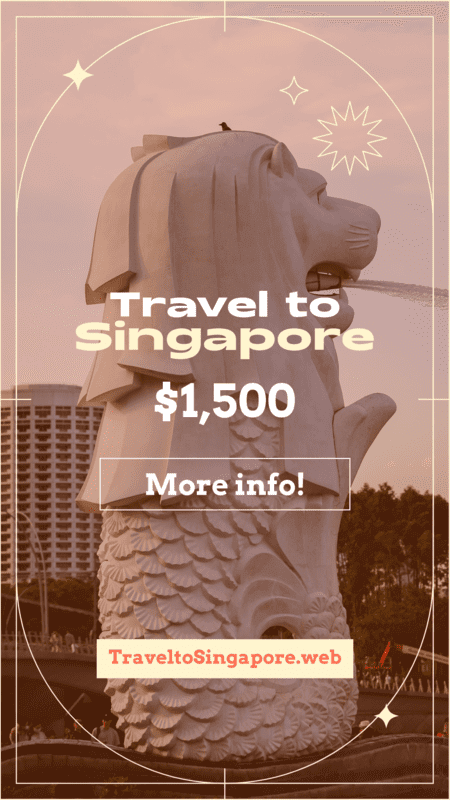
A big part of starting and evolving as a travel content superstar is undoubtedly creating content, also known as your golden ticket. But here’s the thing: it has to be top-notch to make people flock to you.
So, the previous steps will guide you to know what kind of content you should create. But hey, we get it – as a beginner, figuring out what to post online can feel a bit overwhelming. But here are our top recommendations:
- Get inspired by other content creators
- Explore travel trends and insights
- Collect and document information from various sources about your selected niche, sub-niche, and target audience
✏ If you’re still a bit lost, here are some ideas to post content entirely related to travel:
🤿 Ideas for Posting Content
- Social media VS reality
- A day in your life as a travel content creator
- Restaurants on Earth that feel unreal
- X things in my suitcase
- Hidden gems in (location)
- Come shopping with me in a (country) market
- Traveling from (origin) to (destination)
- Top spots to explore in (destination)
- Maps and travel tips for (your niche target audience)
- Bucket list destinations in (city/town)
- The real side of exploring (spot)
- How to spend (x days) in (destination)
- (City/town) during (season)
- x things you should know before visiting (country)
- You arrive in (location), and this is your view
- x weeks itinerary in (destination)
- What ($number/money) per night gets you in (location)
So, no more roadblocks when it comes to generating content ideas! 😉
⚡Quick Tips:
- Consider your target audience and your passion for travel.
- Think about what you’d like to see as someone who loves to travel.
- Remember that you’re pursuing your dream to make your travel passion profitable, so create content you enjoy and inspire you on this journey.
🛟Life Savers When Recording and Editing Videos
Also, consider these recommendations if you’re a UCG creator and need to edit your videos. These travel video recording and editing tips will save you a lot of time and stress:
🎤 Talk to the Camera and Show Your Personality. What better way to infuse your personality than by showing yourself and speaking directly to the camera? This helps your audience feel more connected to you.
🪩 Integrate Trends (But Don’t Make It All About Them). Trends are fantastic, but they shouldn’t be the sole focus of your content strategy. Mix things up, including informative, educational, funny, relatable, and inspiring content.
📽️ Learn How to Edit Videos and Capture Great Shots. A common mistake made by newbies is filming only from left to right or vice versa. Additionally, to add variety, try capturing moments like sipping wine, enjoying delicious pasta, recording ocean waves, and incorporating this dynamism into your videos. Finally, avoid long pauses to keep your audience engaged.
🤫 Reduce Background Noise. Another critical consideration is eliminating background noise from the beginning, which can disrupt your video’s impact. You can also include a pleasant soundtrack or add a voiceover message.
✏ Polish Your Writing Skills for Captions and Copy . Video creation also involves honing your writing skills, whether you’re adding text to your videos or crafting captions for your social channels.
With these tips, you’re all set to level up your video game and keep your audience returning for more. Check out some real-life examples:
@alexandranraiss Finally getting around to posting about my once in a lifetime, bucket list trip to Tanzania. #africansafari #safari #tanzania🇹🇿 #tanzaniasafari #bucketlist ♬ sonido original - KiaraMarBalto
@izathindwaofficial What you get in Sapa, Vietnam for as low as $16 per night ! 📍 @viettrekking.sapa , Vietnam Rooms starting at $16 per night each boasting incredible mountain and rice field views! If you needed a reason to visit sapa then here it is. *this exact room is the bungalow Mountain View room for $100/night* #sapa #vietnamtravel #beautifuldestinations #beautifulhotels #vietnamhotel #sapavietnam #vietnamtravelers #fyp ♬ original sound - izathindwaofficial
💣As vertical videos take the world of TikTok and Instagram by storm, keep reading How to Make Instagram Reels That Reel-Ly Go Viral to level up your travel content on this app.
🧳Essential Tools to Include in Your Suitcase
Creating content is such an adventure! Your witty mind is your trusty guide to brewing up those fantastic ideas. And when it’s time to add that extra touch of style and professionalism, don’t hesitate to team up with some helpful outside resources. Here are your must-use:
Your favorite design tool from now on! At Placeit, you can find a wide array of gorgeous and aesthetic travel-oriented design templates. Including logos, mockups, videos, and, indeed, designs for social media.
The best part is that all our templates are crafted by professional designers who have done their work by diving into the travel world to bring you exactly what you’re looking for – whatever it may be!
Unpack These Travel Templates
🎬 vsco and capcut.
When it comes to giving your images and videos that extra special touch, these online editors are here to make this task easier. And the best part? They’ve got a bunch of cool templates (including trends) to make your graphics look aesthetic.
🔛 Wetransfer
Your future ally in the making! While you’re still building your online presence and gaining followers, keep Wetransfer in your back pocket. This free tool lets you send large files, such as videos, documents, presentations, or portfolios, to your clients.
🔗 Linktree or Beacons.ai
These tools allow you to create a unique link for your travel content creator account. This way, your instagram bio looks cleaner while concentrating all the resources you need. For instance, links to your portfolio, affiliate links, digital products, coaching calls, ebooks, and more.
AI tools are all the rage right now and can be a powerful idea to equip you with content and collaboration ideas for your travel posts. And even help you write your pitch when you’re trying to approach the travel brands or tourism boards you want to work with.
🎙️ Teleprompter
This advanced tool works like a floating app to read lines when filming a UGC video. Say goodbye to the stress of memorizing every single line and focus on what matters the most.
Finally, remember that this travel content creation journey involves developing and honing your skills. Whether it’s writing, editing, designing, or managing platforms, these skills are vital for creating top-quality content and strengthening your online presence.
📌 Last Tips on Travel Content Creation
- Aim to post between 1 to 3 times per day, but always prioritize quality.
- Take a moment to sit down and brainstorm the type of content you’d love to share. Organize it into categories to add delightful variety to your travel content. This not only keeps your content fresh but also simplifies the organizing process for you as a creator.
- Finally, ensure you use relevant hashtags and SEO on platforms like Instagram . This way, you’ll attract the right kind of visitors who share your passion for travel. As your follower count starts to grow, remember to interact with them. Building a tight-knit and beautiful travelers’ community involves listening to their feedback, answering their questions, and creating content that excites them to see.
Wondering how to turn your passion for travel into income? Well, here’s the scoop: diversifying your income sources is a game-changer. However, if you’re immersing yourself into this travel content creation world, consider that it might be possible to earn 0 dollars; that’s why the above steps are extremely important to build a successful travel career.
Plus, remember, even as you become a travel pro, you’re not going to be traveling all the time. So here are some ways to make money from traveling as a content creator. 🤩
🤑 Sell Digital or Physical Products
A great way of passive income is by selling digital or even physical products on a virtual store that contains all the resources to offer to your target audience. Some good examples can be:
- Online Courses
- Portfolio Templates
- Printable Templates
- Travel Ugc Pitch Templates
- Tourism Board Lists
💡Note: They call it ‘passive income’ for a reason! You can be scaling a mountain in Bali, and these content gems or physical products can fly off the virtual shelves without you lifting a finger.
🏄 For diving fully into this topic, keep reading Mastering How to Sell Digital Products: A Comprehensive Guide
🤩 Get Into Affiliate Marketing
Amazon favorites, for instance, are a sensation among the online community in the travel industry, especially on sites like TikTok. So, if your niche involves travel gadgets or must-haves for those long journeys, you can recommend these products through a link and earn a commission for talking about the products you love.
The good news is that many travel and non-travel brands have affiliate programs to help you earn money. Including Placeit with our affiliate program . 😉
🤑 If this sounds interesting, don’t miss out on our guide on How to Get Started With Affiliate Marketing
🚀 Through Social Media
In today’s world, social media platforms are much more than just places to share content. They’re a great ally when it comes to getting some dollars from it, and of course, thanks to your job as a creator. Whether you’re a travel content creator, travel blogger, travel influencer or UGC creator.
✨How to make money off Instagram : Turn your passion into profit by collaborating with brands, getting sponsored, opening your Instagram shop, and monetizing with video ads. The opportunities are endless!
⚡ How to make money on Twitch : Take the stage as a Twitch affiliate or partner, sell merchandise, seek donations, and go after sponsorships. Your Twitch journey as a travel content creator awaits you!
🌟 What about YouTube : On YouTube, you can earn from brand ads that appear during video views, join the new YouTube Creator Fund, and become a YouTube partner.
💡Lastly, regarding making money on TikTok : You can get direct traffic to your online store, use TikTok shopping to promote your products, or create engaging branded content.
In the following step, we’ll reveal two more ways, so stay tuned! 🚀⤵
This step is a cornerstone in building your presence and unlocking a world of opportunities in the travel industry.
Here, you can have the chance to connect with other creators and reach out to industry professionals, hotels, airlines, and travel brands. So, be sure to follow the steps we’ve outlined above and also the next ones:
@fleur.vonk Learn yourself the skill called (ugc) content creation and eventually the hotels will even reach out to you 🌞✌🏼🛫 #contentcreator #travelcontentcreator #ugccreator #ugcjourney #ugcexample #airbnbcontentcreator ♬ Prada - cassö & RAYE & D-Block Europe
✈ Travel UGC Opportunities
This is a fantastic opportunity for aspiring travel content creators like you! User-generated content (UGC) can be text, video, or images and helps brands promote their products, often incentivizing sales.
In the online world, real people frequently upload authentic videos of themselves trying out or showcasing products from brands they love. The difference is that this content can be freely shared, either for the joy of recommending a product to their audience. Or to earn extra cash, receive free items and services.
This approach is highly popular because sometimes brands can’t create such content in-house and seek talented content creators who align with their purpose, values, and brand fits. Even if you start from free, you gain visibility and the attention of the brands and travel boards you want to work with.
🤩Did you know you can land a sponsored hotel collaboration even with just a few thousand followers? The real secret lies in the value you bring to the table. And often, the quickest way to get noticed is by becoming a user-generated content (UGC) creator and crafting top-notch content.
🤝 Brand Deals or Brand Collabs
And finally, the most juicy and gratifying way to live life as a travel content creator: partnering with your dream travel brands for sponsorships and collaborations.
This is the ultimate goal, where you, as a creator, work closely with a specialized travel brand to create content that promotes destinations, accommodations, transportation, activities, or anything related to the travel niche. Like UGC, you can receive monetary compensation, complimentary stays, or a combination of both.
✨ Therefore, to achieve this way of monetizing, you’ll need to:
🌴 1. Create a Beautiful and Professional Travel Portfolio
Surprisingly, many travel content creators overlook this crucial tool, yet it’s essential when pitching to hotels, tourism boards, and travel brands.
Your travel portfolio will include information about yourself as a content creator. But mainly, it’ll focus on providing real travel examples of your trips and some statistics of the properties or brands you’ve worked with.
Now, you might be wondering, ‘But what if I haven’t even started yet?’ Here’s the secret – even if you’re starting from scratch, you can create a compelling portfolio with the ‘fake it till you make it’ mindset. How? Simple! You can build case studies based on trips you haven’t been sponsored for – perhaps your next holiday. Imagine any upcoming journey as a paid opportunity and use it to create fantastic travel content that you can proudly showcase in your portfolio. Even a local long weekend getaway or a tourist-like exploration of your own city can kickstart your portfolio journey.

😊💡 Pro Tip: For helpful visual inspo for your portfolio creation, check out TikTok. Regarding templates, consider browsing Envato Elements .
🤩 2. Send a Great Pitch to Your Dream Companies to Get Sponsored Deals
Now that you’ve created and got your trusty portfolio in hand, it’s time to craft a pitch in writing or video format.
A pitch in the travel world is your golden ticket to show why you’re the perfect fit for that specific travel company and how you can bring value through your content.
😎 Here’s what your pitch should include:
- Your name and contact information
- Subject line
- About yourself
- Details about your audience
- Why you want to work with them
- Collaboration ideas
- Benefits for the brand through your work
- Deliverables in terms of content pieces
- Promotion and amplification strategies
- Compensation and terms
😊 Friendly Reminder
Pitching to your dream travel partners and not hearing back immediately is perfectly fine. But here’s the key – don’t give up! You can follow up and might need to send a gentle reminder 3 to 4 times, as sometimes their accounts are flooded with messages.
But there’s more to it! Make yourself visible, not just in their inbox but also in their feeds. Interact, comment, and show some love by liking their posts. You want to be on their radar.
And if, despite your best efforts, you’re still not getting the responses you desire, it’s time to re-evaluate your pitching strategy. Showcase and highlight the incredible value you bring as a travel content creator. And create a pitch that lets them know why they can’t afford to miss the opportunity to work with you.
Ver esta publicación en Instagram Una publicación compartida de Melbourne (@visitmelbourne)
🌍 3. How Do You Find Your Next Travel Board or Travel Partner?
It’s 100% sure that browsing the web, you’ll find some seasoned travel content creators generously sharing these valuable resources on their TikTok pages for free. But if you’re searching for a quick and easy solution, we’ve got your back!
Head to Instagram and look for the destination you’re interested in. Look for the official accounts – they usually start with “Visit” or “Explore”—for example, @visitmelbourne .
Or, take a virtual trip to Google and search for “Melbourne tourism board” and open the official page, and they have all the official accounts at the end.
⭐Pro tip : focus on cities rather than whole countries – it’s a smoother ride when reaching out. But remember, before you reach out to travel brands, ensure to:
- Pick a niche and a sub-niche
- Create your personal brand
- Pick your online platforms
- Produce consistent and top-notch content
- Work on building a loyal travelers community
- And prepare to network and collaborate with travel partners
And that’s it! You’re ready to approach those dreamy travel brands, whether it’s an official tourist site, a hotel, an airline, or anything related to travel and tourism.
Working full-time as a travel content creator might seem easy, considering there’s no need for a degree or qualification. However, while the idea of traveling the world and getting paid for it is indeed exciting, the truth is that it requires a lot of effort, dedication, research, and knowledge.
No one said it was going to be easy, but it’s worth it. You need to trust the process and remember that all the prominent travel content creators were once in your shoes, earning nothing in the beginning and even for months. The key is consistency, keeping up with your postings, and maintaining quality throughout your work. In the end, all your efforts will be reflected and pay off.
In the meantime, continue developing your skills, staying informed, and remaining up-to-date to demonstrate that it’s possible to have a job that doesn’t feel like hard work. ✨😊✈
Leave a comment Cancel reply
Save my name, email, and website in this browser for the next time I comment.
By using this form you agree with the storage and handling of your data by this website. *
Don't miss our newest content
Get the insight you need to help your brand succeed! Sign up for our monthly newsletter and stay up to date on our latest blog posts - it's free!
Send me the latest in...
You did it!
We're hard at work preparing our next newsletter.
See you soon!
Dream Travel Jobs: How I Lived in Italy + Got Paid To Travel To 10 Countries
Home » Europe » Dream Travel Jobs: How I Lived in Italy + Got Paid To Travel To 10 Countries
Does living in Italy and getting paid to travel around Europe sound like a dream job to you? Well, as a freshly graduated college student who fell in love with Italy when studying abroad, it sounded like the perfect job for me! I’m going to explain how to become a travel guide in Europe.
Today, I’m talking all about my year living and working in Italy as a student travel guide. As someone who has always been passionate about traveling, I wholeheartedly believe that choosing to live and work in Italy after graduating is one of the best decisions I’ve made.
While most of my friends were settling into their 9-5 routines, I was busy traveling around Europe and exploring Italy. In fact, in my year working as a student travel guide, I actually got paid to visit over 10 countries and 20+ cities. Working as a student travel guide was such a rewarding experience, and is a huge reason why I was able to afford to travel so much!
That being said, working abroad wasn’t all pretty Instagrams and gelato-keep reading to learn more about this travel job, and see if working as a student travel guide is right for you!

How I Found The Job
Believe it or not, the job actually sort of fell into my lap while I was studying abroad in Florence, Italy. If you have ever studied abroad in Europe, you may remember meeting a few Americans, fresh out of college, working for student travel companies in your city. I headed on a couple of trips with the company I would later work for, and the tour guide I befriended would later become my boss! When the time came around to apply, my friend made sure to send me an application, and the rest is history.

Landing The Job
You don’t always have to know someone at a student travel company to get hired, however, it definitely helps. The job is very social, so having someone to vouch for your personality will definitely get your resume to the front of the applicant pile. If you are planning on studying abroad and think this job might be for you, then I highly recommend befriending a tour guide or two who you can use as references later.
If you don’t know anyone at a student travel company or haven’t studied abroad, then just be sure to put together a great application that shows how perfect of a fit you are for the job.
What are student travel companies looking for?
Student travel companies are looking for outgoing, social, motivated leaders who love traveling and are great at selling and putting themselves out there. On your application, you will want to highlight any involvements you had in college, and social groups you may have been a part of. On my application, I emphasized my love of travel, social media savvy, past work experience, and my involvement in a sorority in college. If you are serious about applying, you can read a bit more about what else these student travel companies are searching for here !
So what exactly does a student travel guide do?

While the travel aspect of the job is what immediately comes to mind for most people, the reality is that the job can be broken down into 3 main categories: sales, nightlife, and lastly, travel. I’m putting travel last because even though this is the reason most people dream about working for a travel company, you actually will only be traveling on weekends, and have many responsibilities during the week!
The most important part of the job is, surprisingly, sales! Most tour guides are paid on commission, meaning that you are paid based on how many trips you sell. The more trips you sell, the more money you’ll make, so this part of the job is paramount.
You’ll spend your weekdays trying to meet as many study abroad students (aka potential clients) as possible in the hopes that they will use your promo code to book a trip. This requires excellent social skills and social media know-how, as your primary way of reaching out to students is either in person or via Facebook.
During the beginning of each semester, you’ll pretty much be working around the clock. You’ll spend long days walking around handing out flyers, constantly messaging students on Facebook, meeting up with students in person, and being a brand ambassador 24/7.

This brings me to the second most important part of the job-nightlife. Many travel companies require you to attend at least 1 nightlife event each week, and oftentimes one every night during the first few weeks of the semester. After all, one of the best ways to meet study abroad students is out at the bars, and travel companies often work with local establishments to promote bars, clubs, and nightlife events while promoting their travel company at the same time.
If you love going out, then you will love this part of the job. To many travel guides it is a great way to extend those college years a bit. If you are like me, and prefer going out 1-2 times a month, this will quickly become one of your least favorite parts of the job.
Tour Guiding

Finally, the best part of the job-traveling! After working hard to sell as many trips as possible, you will finally be able to enjoy all of your hard work on the weekends. Many travel companies base who is going on a weekend trip on sales, so it is important to sell well during the week if you are hoping to go somewhere during the weekend. As a travel guide, you will be expected to help lead a group of around 50 study abroad students with another guide or two.
You will start out as an assistant guide-usually taking photos, counting to make sure the group is all there, making sure no one gets lost, and assisting the Lead guide.
Lead guides, which you may be promoted to at some point, are in charge of everything else-coordinating with the bus driver, making sure the group arrives at scheduled activities prepared and on time, leading walking tours, and dealing with any unexpected situations that may pop up. It can be quite a responsibility!
As a top seller in my company, I was traveling nearly every weekend-which was totally awesome but can also be very exhausting! Long overnight bus rides, late nights out with students in different countries, and tour guiding can be quite tiring, but getting to explore different places all the time was so worth it.
How much do student travel guides make?

This is a tough question to answer, as pay varies greatly between different companies, and often depends on your sales abilities.
Generally, tour guides have free accommodation, earn commission from sales, and may (or may not) be paid to lead or assistant guide on tours. Commission percentages, housing situations, and tour guide pay varies widely between companies, so it is hard to put together an exact number.
In my particular situation, my rent was covered as I lived in company housing, I had all of my expenses paid when on a trip, and I was also paid to be a lead guide (although I was not paid as an assistant guide).
My first semester, I pretty much broke even, however, during my second semester working I was able to save enough money to help fund a three month trip through Greece , Spain , Portugal, and Morocco. That being said, few tour guides make this much money-I was a top seller at a smaller company, whereas some larger travel companies are much more competitive.
If you are thinking about working as a student travel guide, then I highly recommend heading abroad with some savings-there is no way to know in advance if your company will have a successful semester or if you will consistently make sales. Make sure you have some money saved up in case you are struggling to earn enough for groceries, and you will definitely want to have enough saved up for a flight home.
The perks of the job

The main reason I wanted to work for student travel company was to travel, and travel I did! During my year working for a student travel company, I was able to visit over 10 countries and well over 20 cities around Europe -while getting paid. It was basically a dream come true. Here is a list of all the places I traveled with my company, many of which I visited more than once!
- Czech Republic
- Netherlands
- Switzerland
- Cinque Terre
- Elba Island
- San Gimignano
The pros and cons

While every person has a different experience working for a student travel company, I’m pretty sure that everyone can agree that there are definitely pros and cons to the job. While traveling around so much sounds like a dream come true, and in many ways it is, there are some pretty big downsides to the job as well.
My favorite parts of being a travel guide were being able to visit so many places without having to spend a dime, living in my favorite city, Florence , and the amazing friends I made while working. I also had some unforgettable life experiences made possible by working as a travel guide-like attending Oktoberfest , sleeping in a prison in Slovenia (it isn’t what it sounds like, I promise), and hiking in Cinque Terre nearly every weekend in the summertime.
Over time, repeating the same itineraries every trip can get a little boring, and my bed in Florence started sounding more and more appealing as I boarded yet another 6-hour bus ride to the Amalfi Coast. I also really had a difficult time keeping up with all of the nightlife events while I enjoy going out occasionally, mandatory nightlife was not much fun for me, and quickly became my least favorite part of the job.
Living with co-workers can also be problematic, but I was fortunate to work for a close-knit company and had great roommates throughout my time living in Italy. Working for an Italian company also took quite a bit of getting useful, and cultural differences (and not always getting paid on time) sometimes made work frustrating.
Final Thoughts

Overall, I had an amazing experience and would highly recommend looking into working for a student travel company to anyone interested in living and working in Europe while also getting paid. That being said, make sure you are clear on exactly what the job entails before applying-I know many people who have gotten the job only to quit within a few months because they severely underestimated exactly how much they would be working, are not outgoing or dislike sales, or couldn’t handle the often competitive work environment, lack of sleep, and nightlife requirements, among other reasons.
For a peek into life as a student travel company, check out these 26 signs that you worked for a student travel company in Europe .
Pin how to become a travel guide in Europe for later:

Join my email list and get exclusive updates & news straight to your inbox.
I will never give away, trade or sell your email address. You can unsubscribe at any time.
You have Successfully Subscribed!
Share this story, choose your platform, about the author: catalina todd.
Man I wish I had known about this opportunity when I first graduated college. A job like this also develops many important skills. Sale being one of the most important skills that people often overlooked. Thanks for sharing your insights!
Yes, I would have totally been up to this too when I graduated!
These jobs are perfect to live abroad, travel, see, and experience. My friends were doing it too, and they are looking to start again once travel is back to normal. Milan is full of these opportunities as well!
Like the Article? Leave a Reply Cancel reply
Tour guiding and travel-related experiences
This information page can help you get started in learning about some of the laws and registration requirements that may apply to your experiences on Airbnb.
Please understand that this information page is general, not comprehensive and are not legal advice. These pages are intended to give you an idea of the types of rules that may apply to your experiences and to help you understand some of the things to consider in relation to your experience.
Different countries, states, and cities have different licensing requirements and rules and it is your responsibility as a host to make sure you comply with local laws and regulations. These pages are not intended to be an explanation of the specific rules that apply in your jurisdiction, or your particular situation, nor are these pages a substitute to seeking legal advice. If you are unsure about how local laws or this information may apply to you or your experiences, we encourage you to check with official sources or seek legal advice.
Please note that we don’t update this information in real time, so you should confirm that the laws or procedures have not changed recently.*
Do I need a license to act as a tour guide?
Experiences hosts that provide tour-related services may require a license, certification, and/or training. Some jurisdictions may have such requirements pertaining to tour guides for specific types of experiences, or activities in specific locations. We encourage you to contact your local government and/or a lawyer to determine whether or not a specific license or permit might be required for your experience.
Many markets have specific regulations concerning tour guiding which may apply to hosts. While these requirements vary from market to market, they tend to include expansive definitions of what constitutes tour guide activity and mandate licensing, including:
- The restriction of licenses issued to foreigners
- The requirement for a potential guides to take a course or pass a test before applying for a license
- The requirement for additional certification for certain tour guiding activities
It is a good idea for you to contact your local government or a lawyer to determine whether a license is required to engage in tour guide activities and obtain more information about the license requirements and procedure for obtaining a license in your jurisdiction.
Do I need permission to give my guests a tour of specific points of interest?
Even if you do not need to be a licensed or certified tour guide, hosts should generally seek permission to give guided tours of private and public points of interest, government-owned land, or public waters. It is a good idea to check whether the point of interest has a website or office number to learn more about guided visits.
Keep in mind that the underlying activity for your experience may also be regulated.
Do I need a license to transport guests as part of a tour?
Many jurisdictions regulate carrying passengers for hire or offering transportation for the specific purpose of guided sight-seeing tours. Typically, operating watercraft for hire, including power-propelled boats, charter boats, tour or excursion boats, fishing vessels, and white water rafts requires registration and can require the driver to hold a special license. Regulation may be based on passenger capacity or geography. Please consult the Transportation page and contact your local government for more information.
What responsibilities do I have to keep my guests safe during their transportation?
Transporting guests may subject hosts to related safety requirements that are often specific to the type of transportation. While vehicles are usually subject to the general rules of the road, operating watercraft involves additional water-related safety obligations regarding items such as personal flotation and sanitation devices.
If you intend to include tour-related transportation as part of your experience, we encourage you to contact your local government or a lawyer to determine what rules apply to you and confirm your experience complies with transportation and license requirements in your jurisdiction.
Can I lease or rent transportation to my guests instead?
Usually, although many jurisdictions regulate this transaction. It is particularly common to see regulations relating to the leasing or renting of watercraft such as kayaks, paddle boats, canoes, and sailboats.
We also encourage you to consider the safety of your guests; whether they need any special licenses to operate the transportation you will rent to them; and whether there are any other activities in your experience, for example consumption of alcohol, that may be incompatible with leasing or renting means of transportation.
Can I sell tickets as part of my experience?
Probably, as long as you do so in compliance with any ticket resale regulations. Some jurisdictions have enacted laws prohibiting the resale of certain types of tickets at higher prices, while others allow this activity with a license. The tickets themselves may also be non-transferrable. These restrictions may not apply to online sales.
If you plan to re-sell tickets as part of your experience, it is a good idea to confirm this is legally permitted in your jurisdiction, as well as consulting the original purchase terms for the tickets and any vendor or venue rules about their resale.
Do I need to register or have a license to offer travel-related services?
Maybe. Depending on the jurisdiction, experiences hosts may be subject to laws or regulations governing the travel industry, such as regulation of travel-related sales, travel agent registration, or occupational or business licenses and related requirements. Activities that may cause a government to view a host as a travel agent include selling, providing, contracting, or arranging travel services such as travel tickets or packages or making reservations for lodging, entertainment, transportation, tours etc. It is a good idea for you to consider whether your Experience may lead you to be classified as a travel agent by your local government and, if so, what additional responsibilities you may have.
Am I subject to any other laws or regulations if I offer travel-related services?
Maybe. Many jurisdictions around the world impose requirements on sellers of travel-related services, regardless of whether the individual needs to register or obtain a license.
If you are unsure about anything relating to your experience, we encourage you to check with your local tourism authority directly, or speak to a lawyer, to discuss your experience and confirm your experience complies with local laws including safety, tax, and insurance requirements.
* Please note that Airbnb has no control over the conduct of hosts and disclaims all liability. Failure of hosts to satisfy their responsibilities may result in suspension of activity or removal from the Airbnb website.
Airbnb is not responsible for the reliability or correctness of the information contained in any links to third party sites (including any links to legislation and regulations).
Related articles
Guiding tours in japan, experiences involving transportation in denmark, create and manage your airbnb experience team.

How to Become a Travel Agent: Everything You Need to Know
A re you great at finding reasonably priced flights and hotel rooms? Does making itineraries and solving booking issues come naturally to you? If your answer is yes, you might want to consider becoming a travel agent. And if you're the designated "trip-planning friend," you're already halfway there.
You might think the the profession is outdated, but that's not what the data shows: According to the American Society of Travel Advisors (ASTA), 50 percent of travelers are more likely to use a travel agent now than they were in the past. Not only are travel agents needed, but the career's earning potential can be impressive, depending on the type of agent you choose to be. Use this guide to learn how to become a travel agent and kickstart your journey into a unique career.
RELATED: 26 Best Trip-Planning Hacks Straight From Travel Agents .
What do travel agents do?
A travel agent's job is to ensure their clients have the best travel arrangements. Using their expertise, they offer advice and essential details about your trip, make your reservations, book flights and hotels, and manage your travel plans overall. Any hiccups regarding your accommodations are handled by them, and they are the best at finding money-saving deals. Travel agents prioritize your needs, like your vacation schedule and budget.
Their goal is to provide peace of mind throughout the trip-planning process so you can get the most out of your vacation.
What credentials do you need to be a travel agent?
You don't necessarily need a degree to become a travel agent, but getting some training within the field could be in your best interest. This not only makes you an attractive candidate to employers and agencies who may require a form of certification , but also helps you appear more qualified, which can help further your career in the long run.
Even though there might not be a degree in "travel agency" per se, you can opt for a related program like business, economics, or hospitality instead.
What do you need to become a travel agent?
There are different ways to become a travel agent, but anyone hoping to break into the field should definitely keep the following three points in mind.
Decide what kind of travel agent you want to be.
Having a specific focus on the kind of travel experience you want to provide allows you to build the knowledge and resources to best help those specific clients. Suppose you want to work in corporate travel: Building your skills according to your niche clientele and field will help you sharpen the skills you need to develop your expertise.
Learn about the travel industry and its trends.
The travel agency field is constantly shifting, so it's important to stay up-to-date on industry changes and trends to know what you should be offering clients. People's preferences are ever-changing, so knowing what's hot and what's not is crucial. Spend time learning which places are popular and unpopular based on the season, or which restaurants are staple visits. This shows a solid and up-to-date understanding your clients will appreciate.
Build your communication and interpersonal skills.
A large part of being a travel agent is advising your clients and earning their trust, which doesn't happen overnight. Presenting yourself as knowledgeable and approachable can encourage them to trust your judgment and recommendations. This is especially important if you're not working with a travel agency, because you'll have to rely more on your brand and relationships instead of leaning on a company's reputation.
Maintaining a healthy balance of communication between you and your clients is also essential, which means scheduling phone calls, in-person meetings, keeping up with emails, and any other form of communication your client prefers.
RELATED: 9 Ways Flying First Class Can Actually Save You Money, Travel Experts Say .
Get certified if you can
Getting a certificate can be pricey and cost hundreds of dollars . So, if this option is not feasible for you, that's understandable. However, while certification isn't a requirement to become a travel agent, it can certainly help you throughout your career. Here are a few certificate programs to consider.
Certified Travel Counselor
This Travel Institute certificate requires at least five years of experience and a Certified Travel Association certification. This course focuses on marketing and building consumer relationships. CTC costs $550 to complete the course and $600 for the CTC Fast Track.
Certified Travel Industry Executive
CTIE is also backed by the Travel Institute and requires at least five years of field experience. This $550 program includes courses on travel business, marketing management, bookkeeping, and travel law.
ASTA Verified Travel Advisor
This certificate is given by the American Society of Travel Advisors and teaches applicants about the legalities of travel and how to solidify relationships with consumers. The nine-course program also focuses on ethical travel advising, agency law, and travel agency compliance.
For ASTA members, the course is $399, and for nonmember independent contractors, it's $598. Travel Advisor nonmembers pay the steepest price, which is $729, and $179 for recertification.
RELATED: 7 Hacks for Flying With Just a Carry-On—No Matter How Long Your Trip Is .
How much do travel agents make?
According to Indeed , travel agents make an average of $53,924, and salaries can range between $30,131 and $96,506, depending on where you live. But other factors can affect an agent's earning potential, like working independently instead of for a travel agency.
A travel agent's income also depends on their area of travel. The Hotel Agency Review 2023 report revealed that corporate and luxury travel agents earn much more than agents who focus on Disney and cruise trips.
Your experience level can also impact your earning potential, as agents who have worked in the field longer are typically viewed as more qualified.
RELATED: The 7 Best Cruises to Book If You're Over 60 .
Do travel agents get discounts on flights?
Being a travel agent doesn't automatically mean you get tons of discounts and deals, but they do have access to perks that can help make planning trips easier and less expensive. Travel agents have the inside scoop on reduced rates because of their relationships with hotels and airlines. As a result, agents share these negotiated prices with their clients to help them save. Agents can, of course, also benefit from this insider knowledge and save money on their own trips.
Thanks to their agents, clients can enjoy luxury accommodations at high-end hotels like Hyatt Privé, Hilton Impresario, Marriott STARS&Luminous, Four Seasons Preferred Partner, and Mandarin Oriental Fan Club, to name a few. These perks range from spa services and later checkout times to room upgrades and complimentary breakfast.
How do you make money as a travel agent?
There are several ways a travel agent can make money in their field beyond selling travel packages or working for an agency.
Travel agents can charge a service fee, which is a base pay clients cover along with any other charges.
Travel agents can also make commissions from their contracts with hotels, tour/excursion companies, cruises, car rental services, and airlines. Add-ons like insurance can also help boost an agent's income, if their client wants it.
Booking group tours can increase a travel agent's earnings because their commission is based on how much their clients purchase, so more people means more accommodations. For example, booking travel for destination weddings or family reunions is an excellent way to book multiple hotel rooms. It's such a lucrative strategy that some agents make group booking their niche, because managing just a few a year can bring in a substantial profit.
RELATED: The Best Day to Book Flights for Your Next Getaway .
Being a travel agent comes with many perks, but ultimately, becoming one takes a lot of dedicated effort. Taking the time to learn about the travel industry is a great way to expand your tourism knowledge and consumer communication techniques. Refining your skills and becoming certified is one of the best ways to attract and retain clients.
So, if becoming a travel agent sounds like the career for you, join this community of globetrotters and combine your love for adventure, great deals, and helping others plan impressive getaways.
In the meantime, you can sign up for our newsletter to enjoy similar career-building content, as well as the latest in wellness, entertainment, and travel.


A Comprehensive Guide to Becoming a Successful Travel Agent
Travel agents play a vital role in the travel industry by helping travelers plan and book their trips. In today’s digital age, the role of travel agents has evolved, and they must be equipped with the right skills and knowledge to succeed in the industry. This article will discuss five tips that can help you become a successful travel agent.
Understand Your Clients
Understanding your clients is the first step to becoming a successful travel agent. Every traveler has different needs, preferences, and budgets. Therefore, it is crucial to thoroughly understand your clients to provide them with the best travel options. To do this, ask your clients the right questions to understand their travel requirements. For instance, if your client is a family with young children, you should suggest family-friendly destinations and accommodations. On the other hand, if your client is a solo traveler, you should recommend safe and suitable destinations for solo travelers.
Stay Up-to-Date with Industry Trends
The travel industry is constantly evolving, and travel agents must stay up-to-date with the latest trends and developments. This includes changes in travel policies, emerging travel destinations, and emerging technologies that impact the industry. By staying informed, you can offer your clients the latest travel options, setting you apart from your competitors. You can stay up-to-date by attending industry conferences, subscribing to industry publications, and following industry experts on social media platforms.
Utilize Technology
In today’s digital age, travel agents must embrace technology to succeed. Technology can help streamline your work processes, improve your communication with clients, and enhance your marketing efforts. For instance, you can use customer relationship management (CRM) software to manage client information and streamline workflow. Additionally, you can use social media platforms to market your services and connect with potential clients. You can also use travel booking software to search for quickly and book travel options for your clients.
Provide Excellent Customer Service
Providing excellent customer service is essential to becoming a successful travel agent. Your clients trust you to plan and book their trips, and you must ensure that their experience is seamless and stress-free. This includes promptly responding to their queries, providing accurate information, and proactively addressing any issues that may arise during their trip. You can build a loyal client base and generate positive word-of-mouth referrals by providing excellent customer service.
Build Relationships with Suppliers
As a travel agent, you rely on suppliers such as airlines, hotels, and car rental companies to provide your clients with the best travel options. Therefore, building strong relationships with these suppliers is essential to ensure that your clients receive the best deals and services. You can do this by attending supplier events, networking with suppliers, and negotiating favorable terms with suppliers. Building strong relationships with suppliers can offer your clients better travel options and competitive prices.
Becoming a successful travel agent requires hard work, dedication, and the right skills and knowledge. You can succeed in the travel industry by understanding your clients, staying up-to-date with industry trends, utilizing technology, providing excellent customer service, and building relationships with suppliers. Remember, the key to success is to stay informed, adapt to changes, and always put your client’s needs first.
Looking to turn your passion for travel into a rewarding career? Look no further than Gateway Travel! Our team of experienced professionals is here to help you become a travel agent and achieve your dreams of exploring the world while helping others do the same. Sign up today!
Recent Posts
Boost Your Travel Agent Productivity with Gateway Travel's Top Five Efficiency Hacks
How Gateway Travel Empowers Agents with Innovative Tools
Niche Travel: How Gateway Travel Helps Agents Carve Out Their Unique Market
Commentaires
10 Tips For Becoming A Traveling YouTuber
Becoming a traveling YouTuber - or vlogger - isn't always an easy startup, but it can be easier with these tips.
Traveling far and wide can require a lot of money . Whenever one does not have enough funds, it becomes necessary to achieve traveling goals. However, getting funds with time as one travels is the best way to deal with all the costs. The big question is where to get a source of income when traveling .
YouTube has become one of the most popular content platforms. People are making millions of dollars from YouTube. Travelers are also utilizing the platform to make money as they travel. It is working, and there are many travelers with hundreds of thousands of subscribers on YouTube and making good money from the platform. Here are tips to follow.
10 Select The Right Content Topic
The first and the most important step is deciding on the theme or topic of the YouTube channel. A traveler must first find the right niche to cover on their channel. This means looking for an area with a lot of demand for content.
A traveler can also choose to mix different topics based on their travel. Other travelers decide to concentrate on everything about their travel, some food, and others give guides or tips about various destinations.
RELATED: Pics Of People Who Ran Out Of Money While Traveling (And Improvised)
9 Offer Original Content
When it comes to offering travel content on YouTube, travelers must make sure they are offering original content . When traveling, a person's YouTube channel works as a reflection or a mirror of what is going on in their life and their experiences.
As a result, people will subscribe and watch more videos if they are natural. People consume and appreciate original travel videos. Viewers want to see the new places and experiences in their natural form without altering the true story.
8 Consistency Is Key
To make money through YouTube, consistency is a must. This is not a different case for a traveler. One must make sure that their videos are uploaded consistently. Views are always waiting to see what will happen next, and one must work hard to provide videos.
The best way to go about this is by coming up with a schedule that will help one keep uploading videos. Designing a schedule depends on how easy it is to get content and available time. That way, views will always know when to expect content hence gaining more subscriptions.
7 Invest In Equipment
Investing in proper cameras and other equipment is a good way of growing one's YouTube account hence making money as they travel. Great cameras translate to amazing videos and great content to the consumer overall.
Some of the equipment to invest in include microphones, gimbals, and other camera accessories that make it easy to shoot and create high-quality content. Some may also opt to buy drones depending on the content they are offering.
RELATED: 5 Money Saving Travel Hacks (& 5 That Aren’t Worth It)
6 Review Destinations
Many people love to see reviews of destinations. This is because many people cannot travel, and those who want to do not know enough about various destinations across the world.
Making review videos about various destinations is a sure way to grow a travel YouTube. In this case, one must be thorough with the reviews. Viewers want videos that are not biased about a review. One should also ensure that they find the most amazing destinations that viewers have never thought about.
5 Proper Video Editing
Raw videos are always good. However, editing videos is a must if one wants to provide the best for their viewers. Editing videos gives them life, and they become overall enjoyable.
Investing in good video editing skills for a traveler with a YouTube channel is important.
This will allow one to introduce great logos, divide videos into different sections, and include a call to action.
4 Make Use Of SEO
Search Engine Optimization is a good tool used to get traffic and viewers on online platforms. Through Search Engine Optimization, one can target a specific group of people that is most interested in the type of content provided.
YouTube SEO offers a chance for a traveler YouTuber to target viewers whose interest is in the type of content they are creating. This increases the number of views and subscribers significantly since people on targets are the right consumers.
RELATED: 15 Cheap Travel Hack Items (10 Items Absolutely Worth The Money)
3 Trending Challenges
Challenges have become popular with the modern-day internet, media, and social media platforms. As a result, people are more likely to enjoy watching various challenges from across the world. A traveler with a YouTube channel can use these challenges to grow the following and subscribers.
This should be done by identifying the best challenges and doing them for the audience. One should make sure they select the trending challenges and do them well.
2 Persuade Viewers To Subscribe
YouTube users may view videos but not subscribe. As a result, YouTubers have a difficult job of pushing viewers to subscribe to their channels. Although it might seem like a difficult job, it is worth it and works well to increase the number of subscribers to a channel.
One should learn and practice the art of persuasion to make viewers subscribe to their channel. Learning the best tricks to use when persuading viewers is the right way to do it. However, one should be creative in the nature of content to get them to subscribe.
1 Collaborate With Others
Working with other travel YouTubers is one of the best methods to grow an account. This is because one is able to work with people offering better methods and content creators. It also provides a chance to do content with reputable YouTubers.
It is also a method that helps one to learn new things and new styles of content creation hence boosting views and subscriptions for an account.
NEXT: 15 Little-Known Ways We Waste Money While Travelling (10 Ways To Stretch Our Dollar)

IMAGES
VIDEO
COMMENTS
Click here to apply. You must have a current passport and be able to travel between July and December 2023. You must upload a video with your application. All members of your group must appear in the video along with individual photos and one all together. Applicants must be Australian citizens or have been a permanent resident for at least two ...
Here are the steps to becoming a licensed tour guide: 1. Determine if you actually want to be a tour guide. Getting paid to travel and visit fascinating sites can be enticing, but it's important to have realistic expectations. Becoming a tour leader does not mean that you get a permanent vacation.
However, different tour guide jobs need a degree. For example, to become a tour guide in a museum, you might require a degree in history-related fields. Here are some key points to consider in determining whether to get a degree or not: Location and Regulations: The requirements for becoming a tour guide can vary by country and region. Some ...
40.36%. High School Diploma. 33%. Bachelor's Degree. 12.01%. One of the most common questions that we always get is what major or degree do I need to become Travel Guides or what courses do I need to take. We also asked Travel Guides what did they major in college or university and here are the top 5 most popular majors that came up.
Step 3: Prepare for the interview process. The interview round depends on the company's recruitment process. It could be one meeting or a series of meetings. The tour operator wants to see if you are the right fit for them and the real deal. It's time to convince them that you can put your money where your mouth is.
While you're there, ask the tour leader exactly what they're doing on a day-to-day basis. Make sure you have specialised skills, such as a foreign language or a PCV driving licence. While they aren't essential for all jobs, they are for some, and give you a great advantage. Knowledge of first aid, or specific country knowledge, is also good.
Certain traits can aid in your success as a travel journalist: 1. Adventurousness: This pertains to the stereotypical aspects of travel journalism, like traveling to distant or unfamiliar parts of the world and meeting new people. 2. Curiosity: A good travel journalist is curious about new locations, cultures, types of food, and people.
Your video should include a piece with you speaking directly to the camera (PTC or piece to camera), you talking to or interviewing someone else, an activity, and the rest is up to you. Ian Wright, our longest-running TV presenter advises: " You know, in any show reel, the first 10-20 seconds are the most important.
7. Consistency is key. Consistency in your posting schedule, the value you provide and the look of your content are essential as a travel content creator. You don't have to post several times a day on all the channels to grow. The most important thing is that your content offers some kind of value.
Apply now to be part of Travel Guides 2024. Ever dreamed of becoming a travel critic? Apply.
Find a program. Becoming a travel agent isn't as simple as declaring yourself one. Typically, the first step is to sign up for a program that'll teach you the basics of running your own travel ...
Here's our list of the best certifications available to Tour Guides today. 1. Certified Tour Guide (CTG) Certified Tour Guide (CTG) is a professional designation for individuals who have completed an accredited training program and passed a certification exam.
Continue your education. Travel agents certified through The Travel Institute must complete a minimum of 10 hours of continued education each year. Our partnerships with more than 100 suppliers make life-long learning easy and enjoyable. Expand your expertise.
Pitching your travel stories is akin to casting a net into the vast sea of publications, aiming to capture the attention of editors and readers. Thorough research is paramount; identify magazines, newspapers, and websites that resonate with your writing style and niche. Tailor your pitches to align with their editorial focus.
What Does a Disney Travel Planner Do? Ultimate Guide to Becoming a Disney Travel Planner. 1: Immerse Yourself in All Things Disney. 2: Complete Disney's Training Program. 3: Join a Travel Agency. Strategies That Work: Unlocking Success as a Disney Travel Planner. 1: Stay Updated. 2: Prioritize Customer Service. 3: Network.
As a travel content creator, your main tasks will involve: Researching and developing new content ideas within the travel industry. Crafting and proofreading content for blogs, social media, video scripts, podcasts, infographics, and more. Editing and creating eye-catching graphics, photos, and videos. Producing audio content, whether in the ...
While most of my friends were settling into their 9-5 routines, I was busy traveling around Europe and exploring Italy. In fact, in my year working as a student travel guide, I actually got paid to visit over 10 countries and 20+ cities. Working as a student travel guide was such a rewarding experience, and is a huge reason why I was able to ...
Experiences hosts that provide tour-related services may require a license, certification, and/or training. Some jurisdictions may have such requirements pertaining to tour guides for specific types of experiences, or activities in specific locations. We encourage you to contact your local government and/or a lawyer to determine whether or not ...
Step #4 - Build an Online Presence as a Travel Writer. Now that you've got a few articles under your belt, it's time to start building an online presence. Your online presence is essentially free marketing that will help get your name out there and build a network.
Expert Cyndi Williams shares the 5 easy steps to becoming a travel agent. Plus what red flags to watch out for in the process. Get Cyndi's Travel Agency La...
Build your communication and interpersonal skills. A large part of being a travel agent is advising your clients and earning their trust, which doesn't happen overnight. Presenting yourself as ...
Conclusion. Becoming a successful travel agent requires hard work, dedication, and the right skills and knowledge. You can succeed in the travel industry by understanding your clients, staying up-to-date with industry trends, utilizing technology, providing excellent customer service, and building relationships with suppliers.
Welcome to Module 2 of "The Ultimate Guide to Becoming a Travel Agent: Basic Start-Up Information." This module will focus on building a solid foundation for a travel agency. Includes identifying niche and target markets, understanding legal and licensing requirements, and choosing a suitable business structure. ...
8 Consistency Is Key. To make money through YouTube, consistency is a must. This is not a different case for a traveler. One must make sure that their videos are uploaded consistently. Views are always waiting to see what will happen next, and one must work hard to provide videos.